Photographs
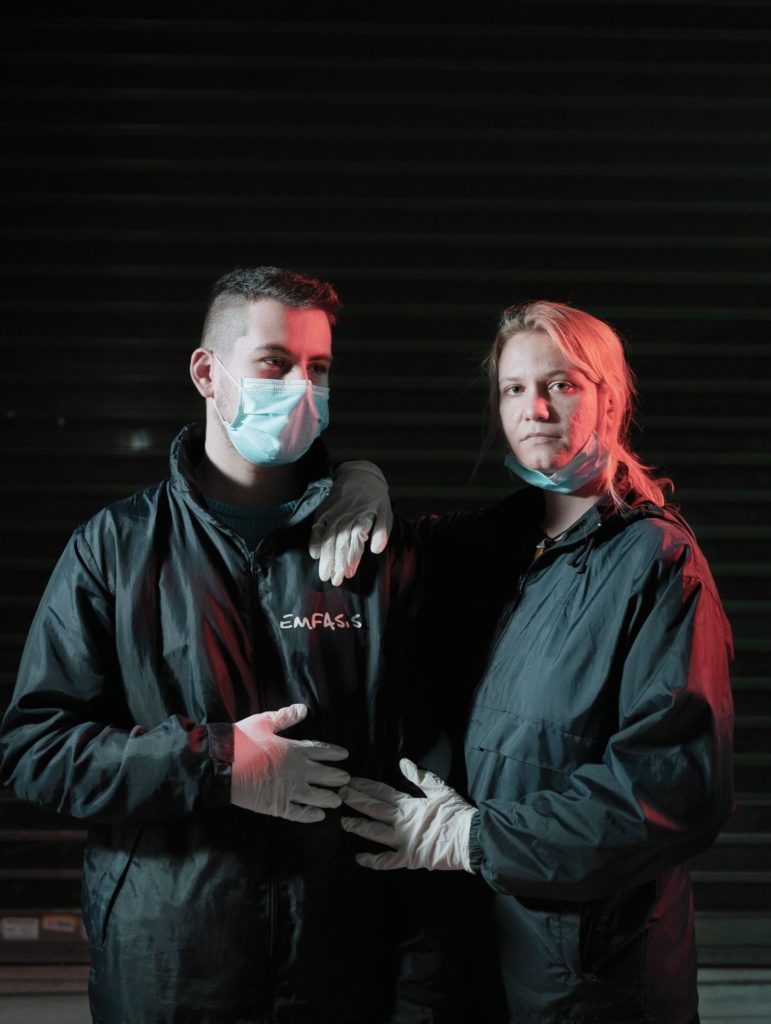
“Right now, our role is to act as mediators between our reality and that of their own”
Panagiotis Michos & Efraimia Michou, Volunteers
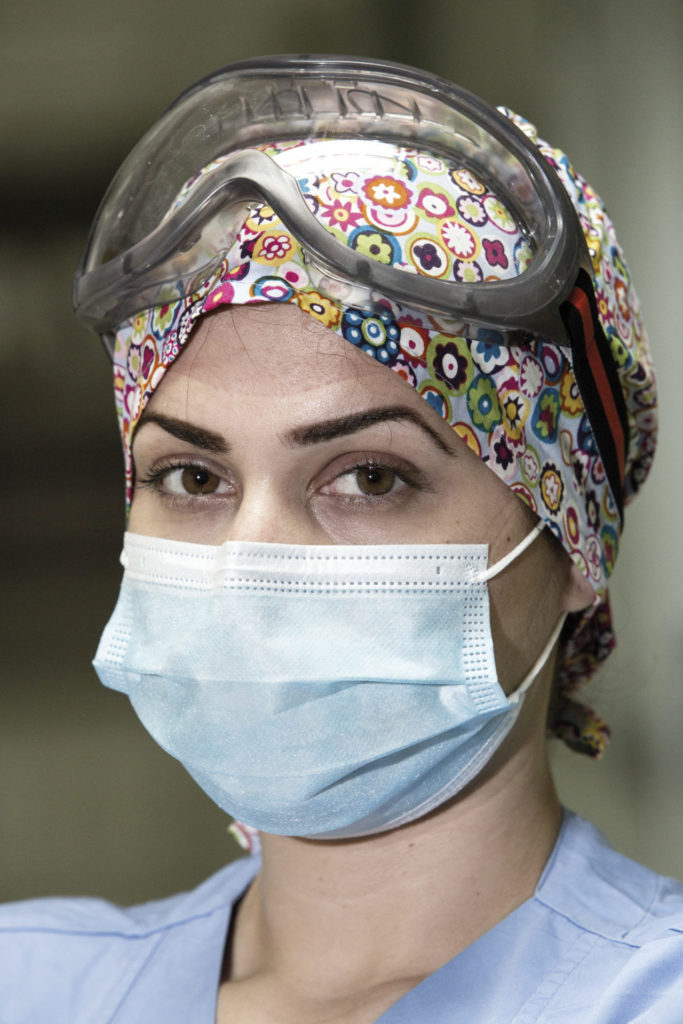
Konstantina Koufidi, Covid ICU – Evangelismos Hospital
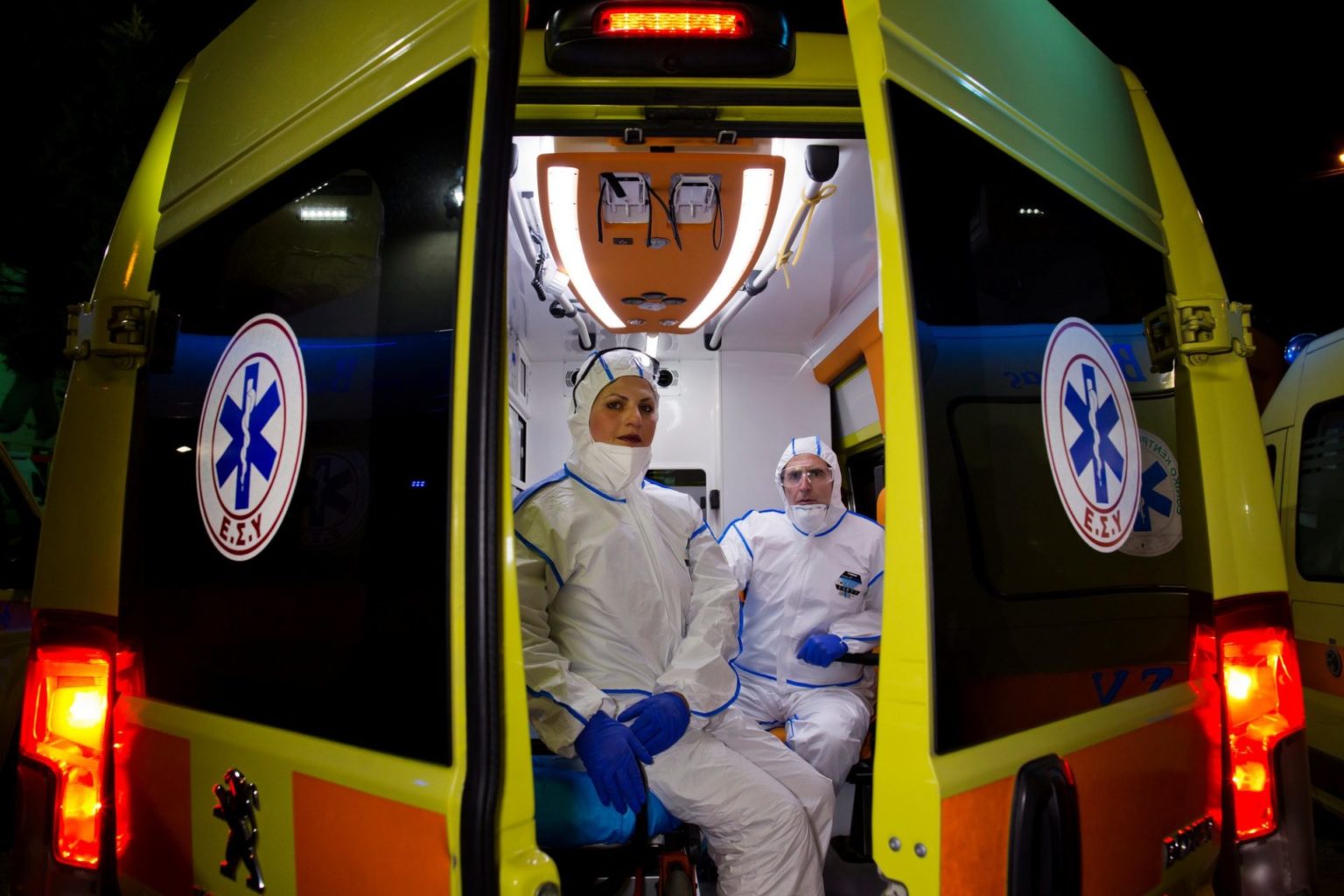
“When I submitted my application to work at the National Emergency Aid Centre (EKAB), following a call by the Minister of Health, I told my friends that “we are going to war”
National Emergency Aid Centre Rescuers Konstantina Papachristodoulou (L), 39 y.o. and Thomas Koulakiotis, 48 y.o., in an ambulance at the EKAB operation centre, 11 April 2020. Thomas Koulakiotis is married and has one child. He has been working as a rescuer in the private sector for the past seven years. When the Minister of Health called for doctors and nursing staff to be hired to deal with the pandemic, he applied and belongs to the first lot of those thrown into the battle against the coronavirus. He started working at EKAB on 1 April 2020.
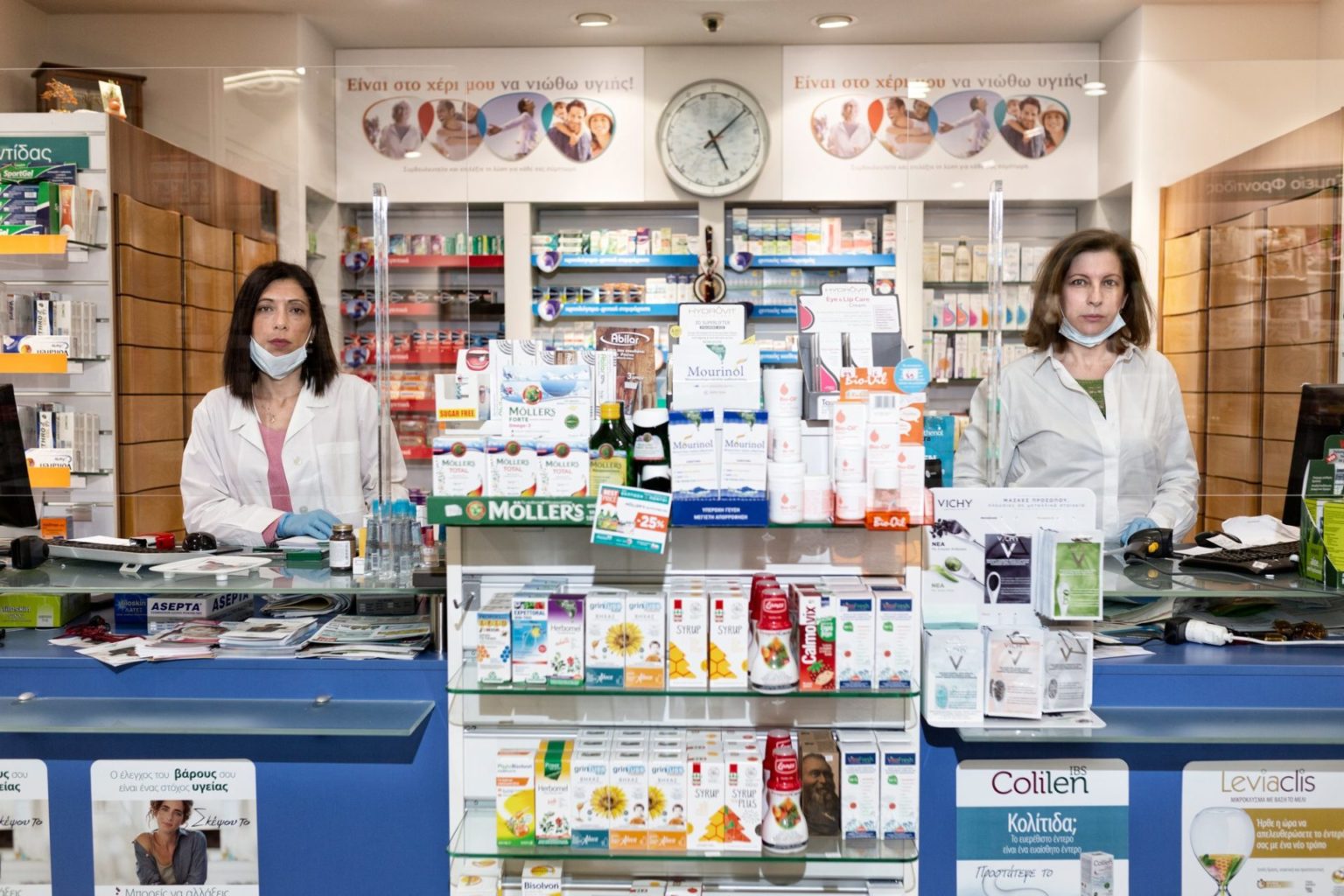
Christina Tsempeli and Fotini Kalpaxi, Pharmacists
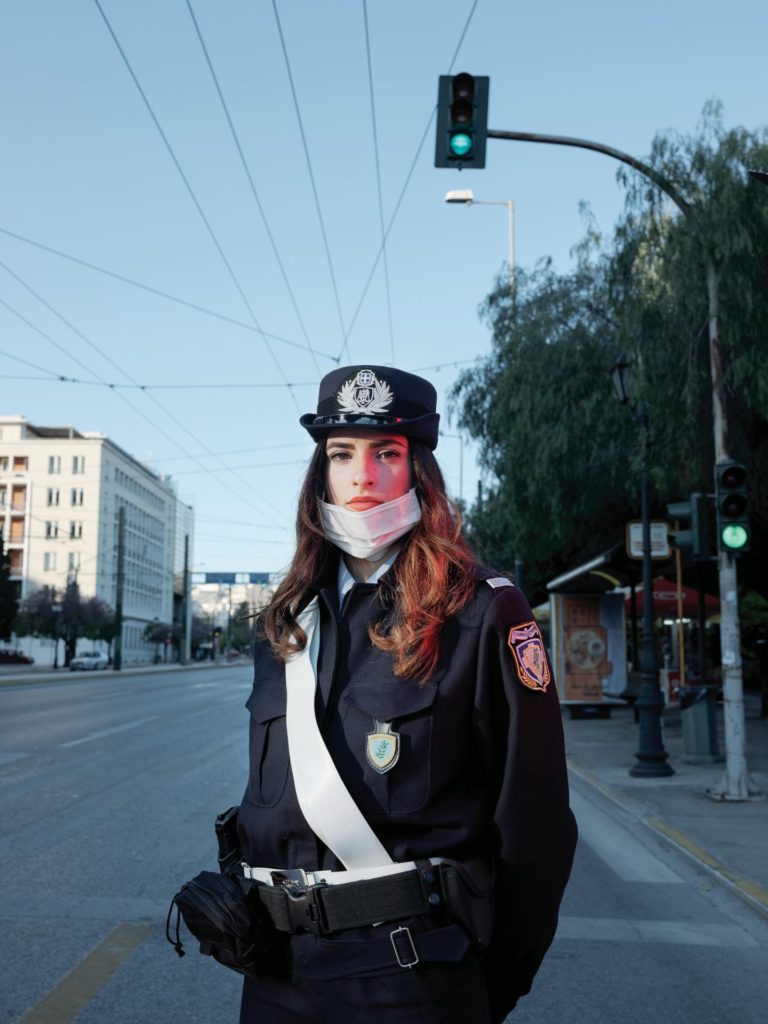
“The people we stop in the street often support us, offering wipes and masks. It's moving”
Vasiliki Iatroudi, Traffic warden
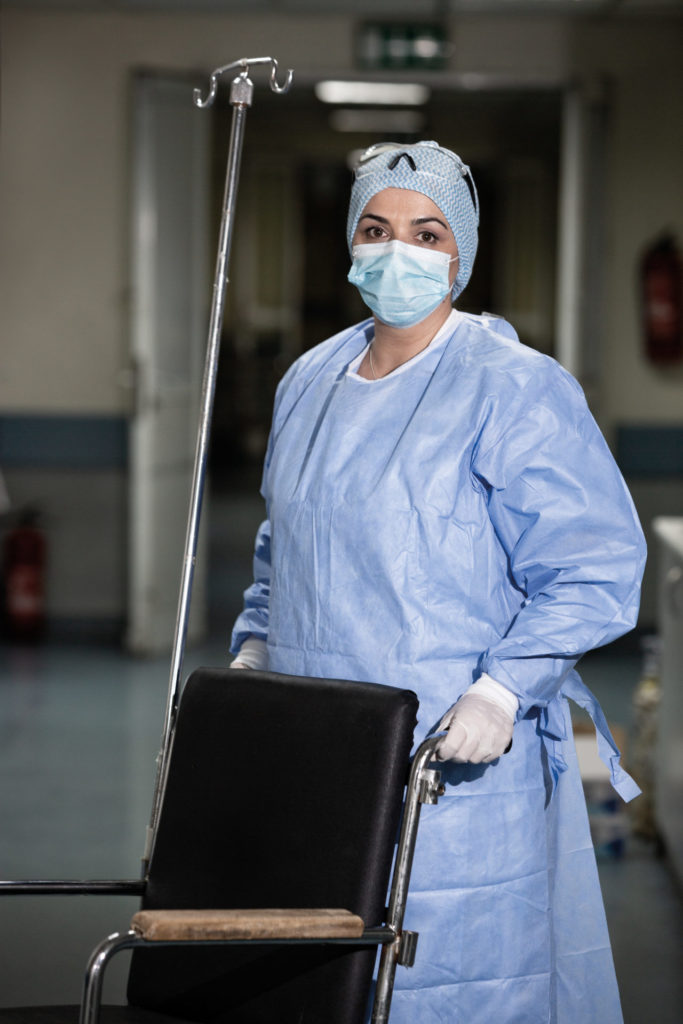
Ioanna Zachopoulou, Paramedic, Evangelismos Hospital
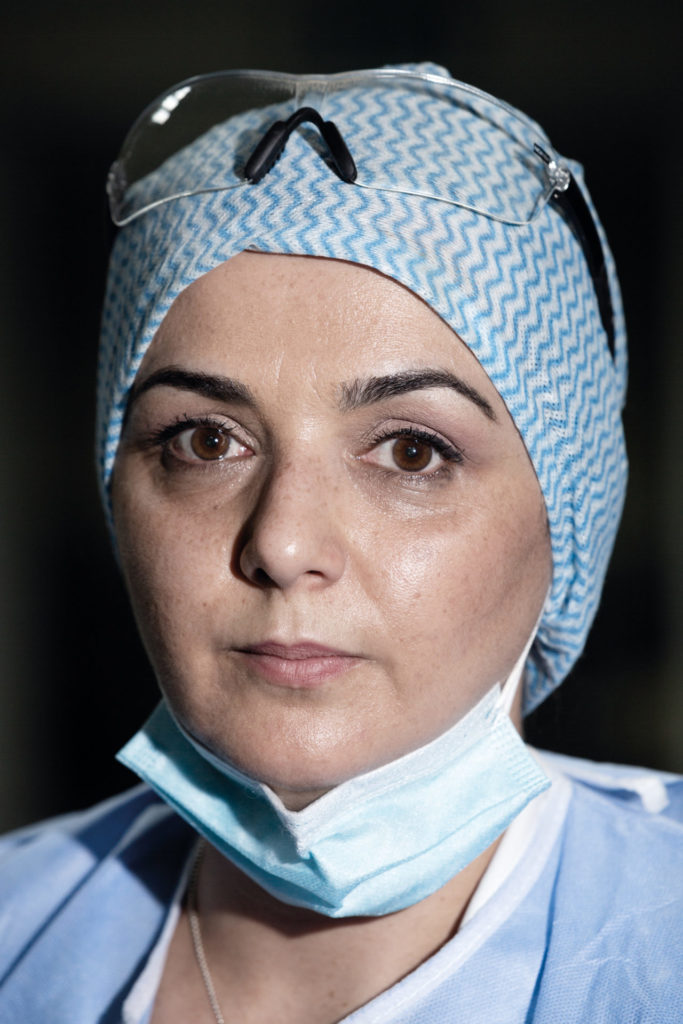
Ioanna Zachopoulou, Paramedic, Evangelismos Hospital
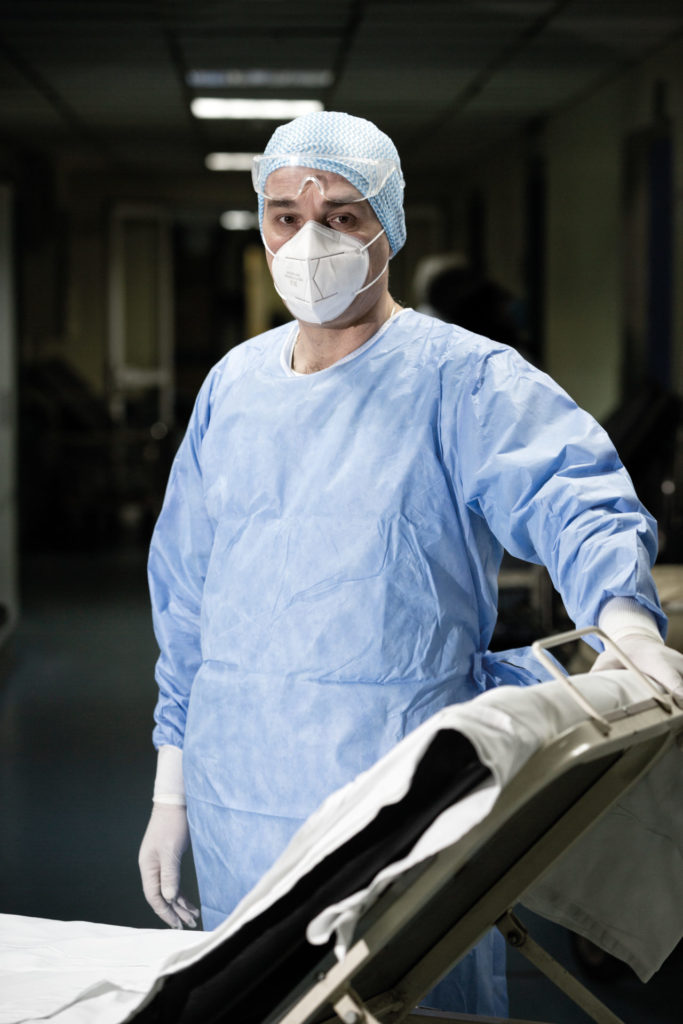
Lambros Kotsiras, Paramedic, Evangelismos Hospital
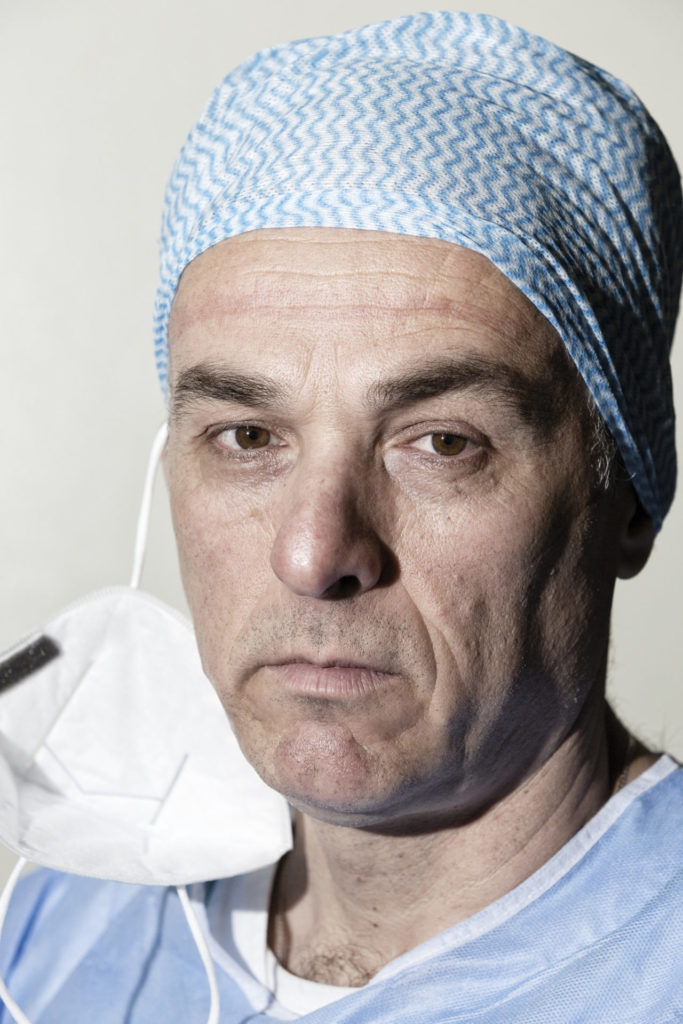
Lambros Kotsiras, Paramedic, Evangelismos Hospital
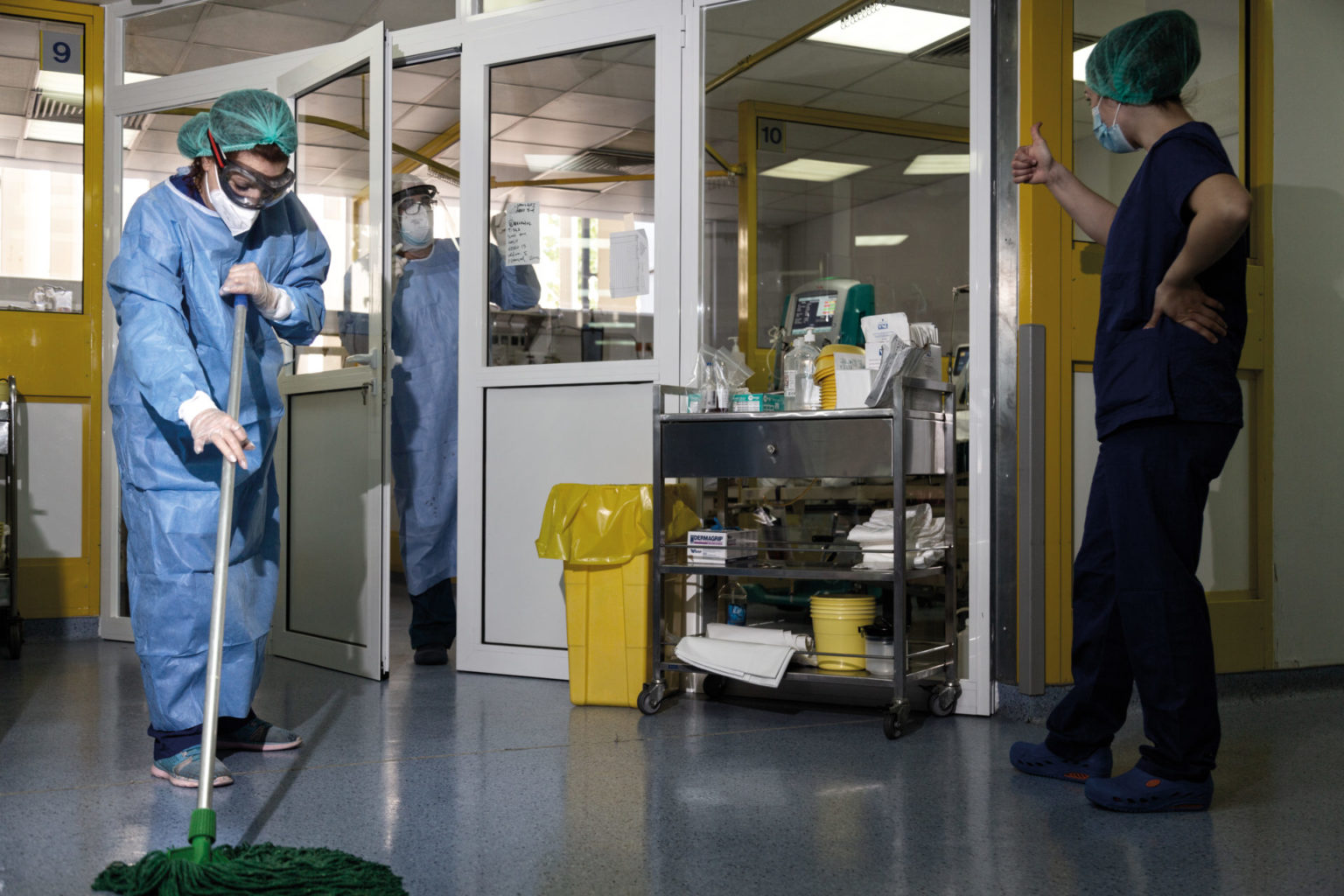
Maria Kyriakouli, Covid clinic cleaner – Evangelismos Hospital
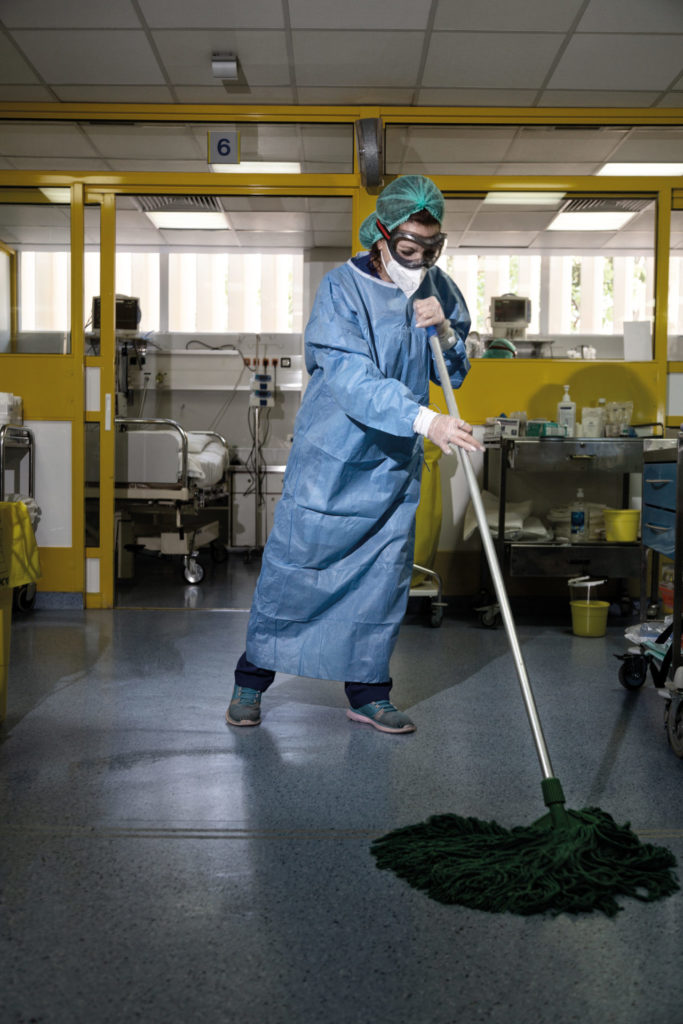
Maria Kyriakouli, Covid clinic cleaner – Evangelismos Hospital
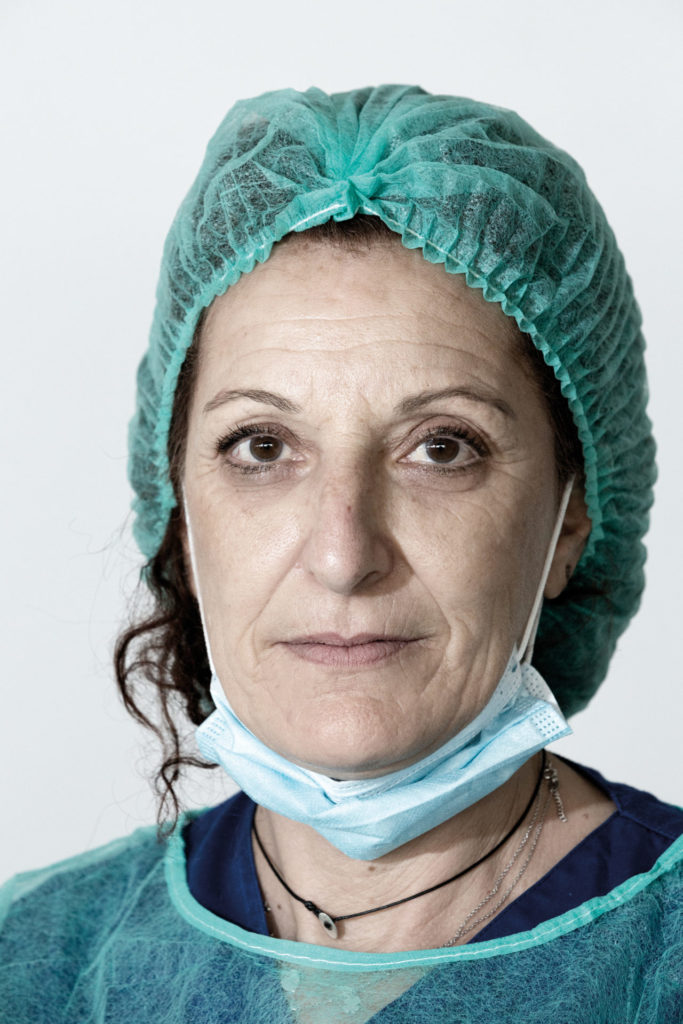
Maria Kyriakouli, Covid clinic cleaner – Evangelismos Hospital
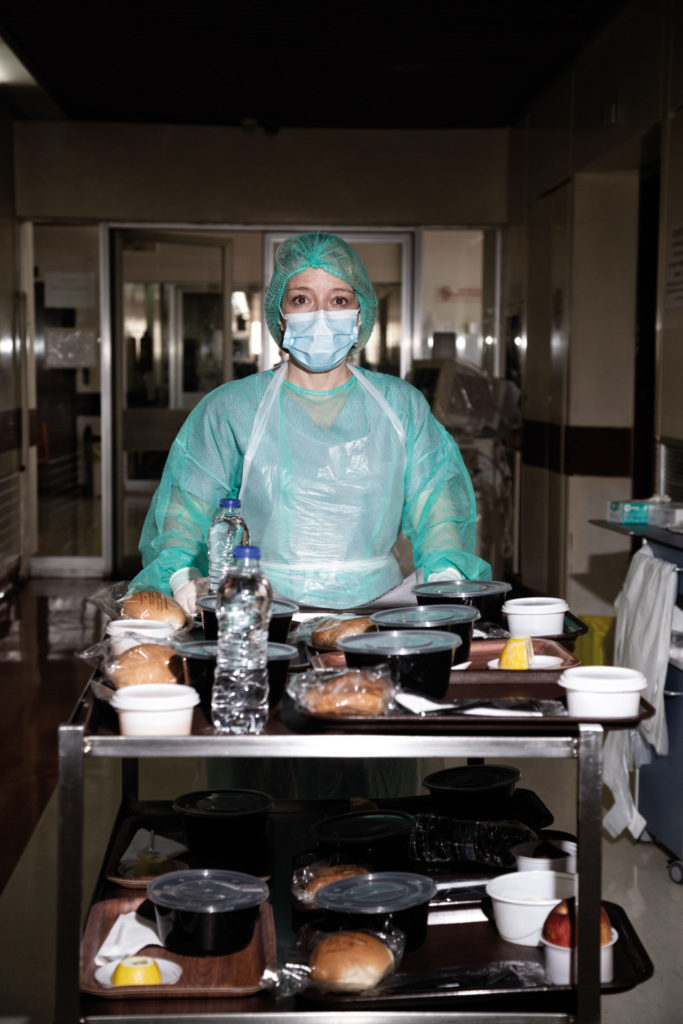
Niki Zamagia, food service worker, 49 y.o., 3rd Covid Clinic, Evangelismos Hospital
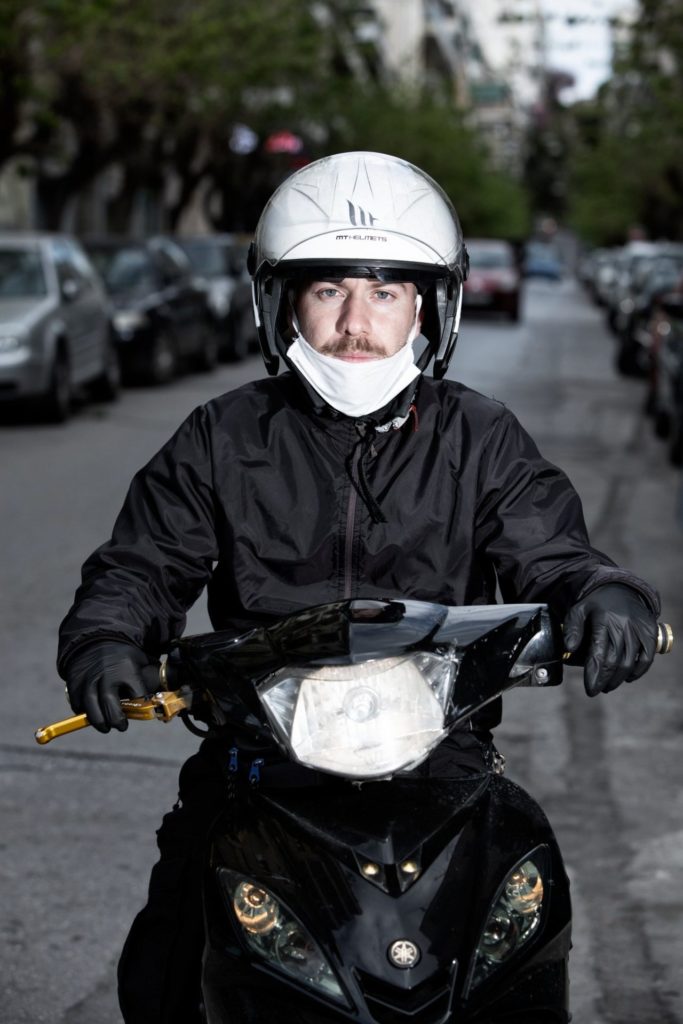
“Now with the epidemic, in addition to helping my mother with all errands, I also deliver groceries free of charge for many customers who cannot leave their house because they belong to vulnerable groups or because they are scared.”
Dimitris Zaros, 25 y.o., Delivery Service Employee
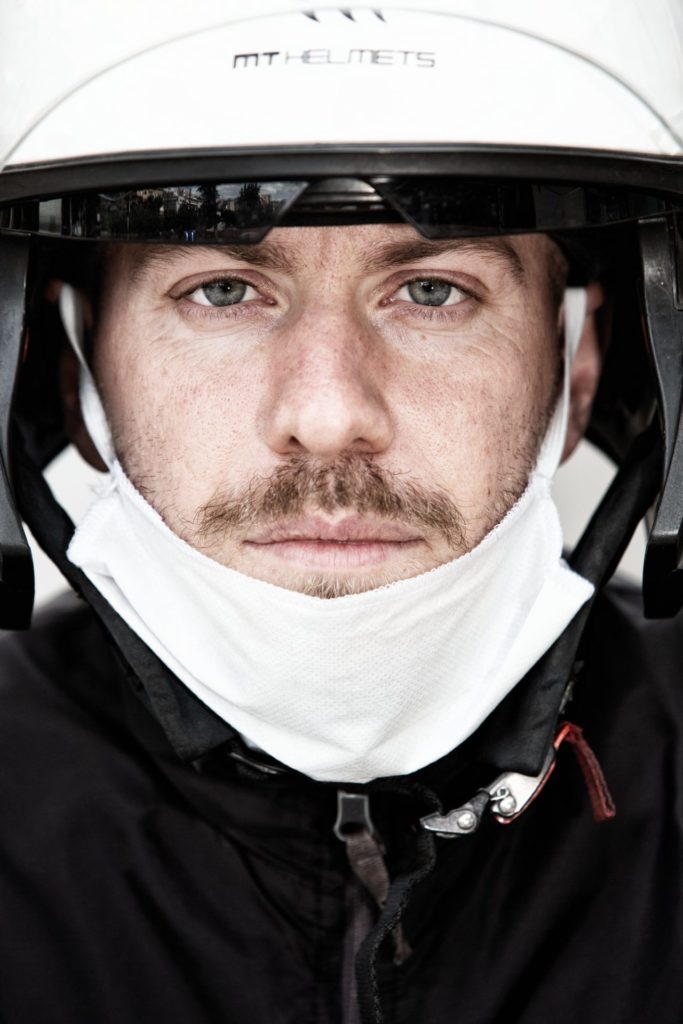
“My life has not been affected, because I continue to work. I’m not scared.”
Dimitris Zaros, 25 y.o., delivery service employee
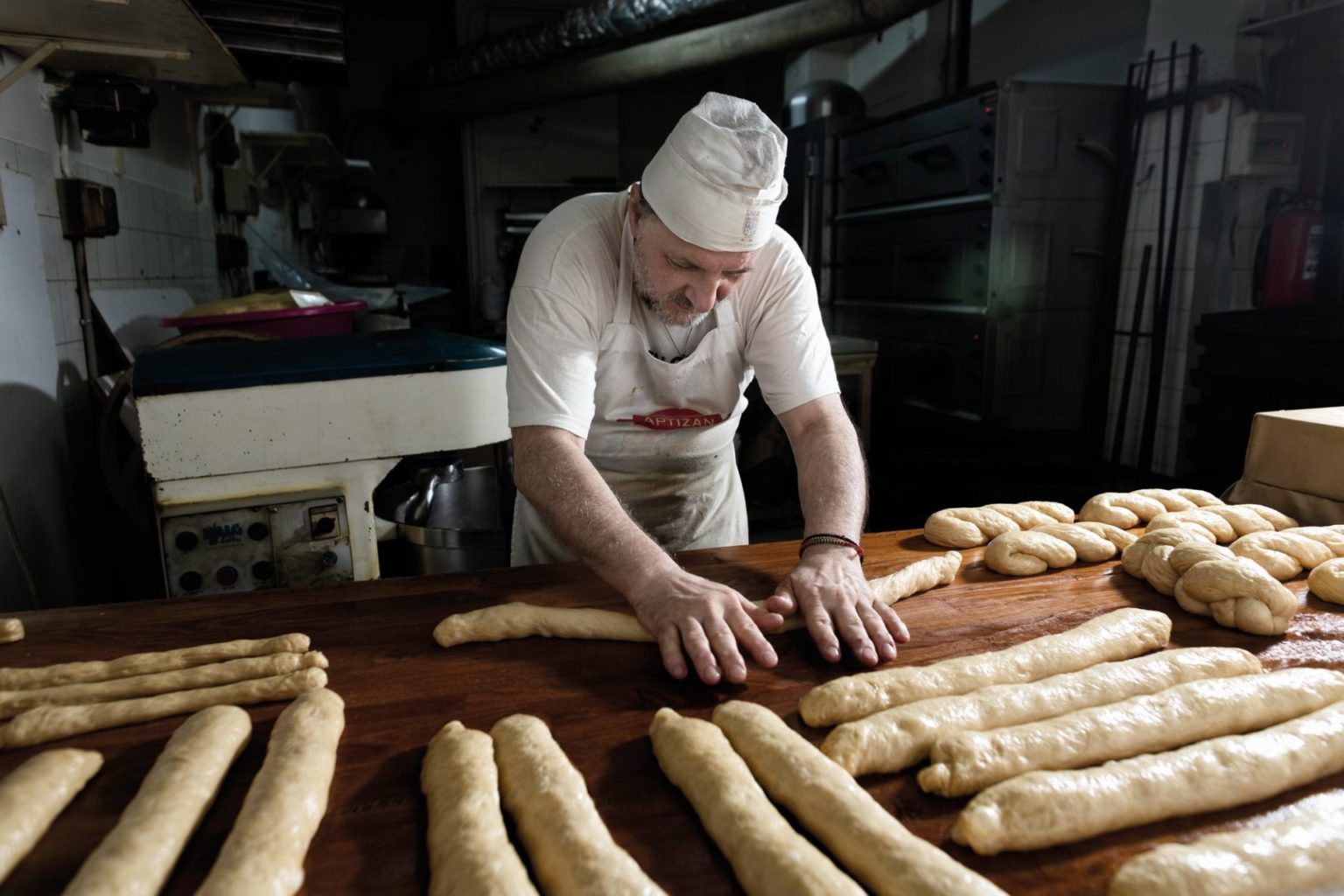
“We make home deliveries of bread to many customers who are too afraid to leave their house or belong to vulnerable groups”
Stratos Doukas, baker since 1973.
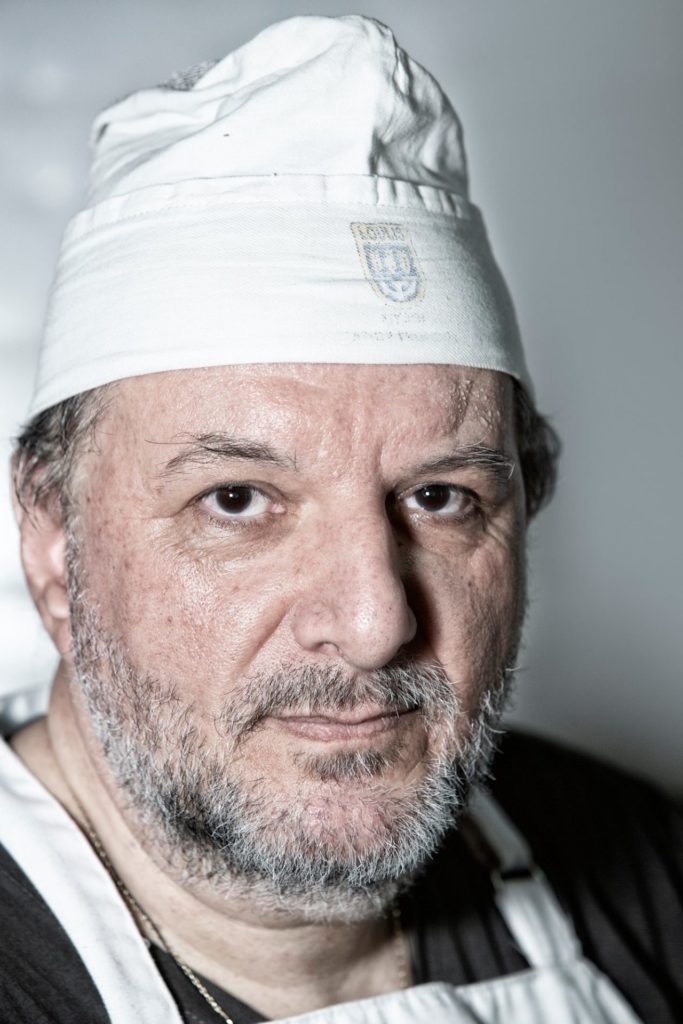
“Consumption has dropped, mainly because many bake at home and, on top of that, will stay at home for Easter, so they only buy the bare essentials”
Stratos Doukas, baker since 1973.
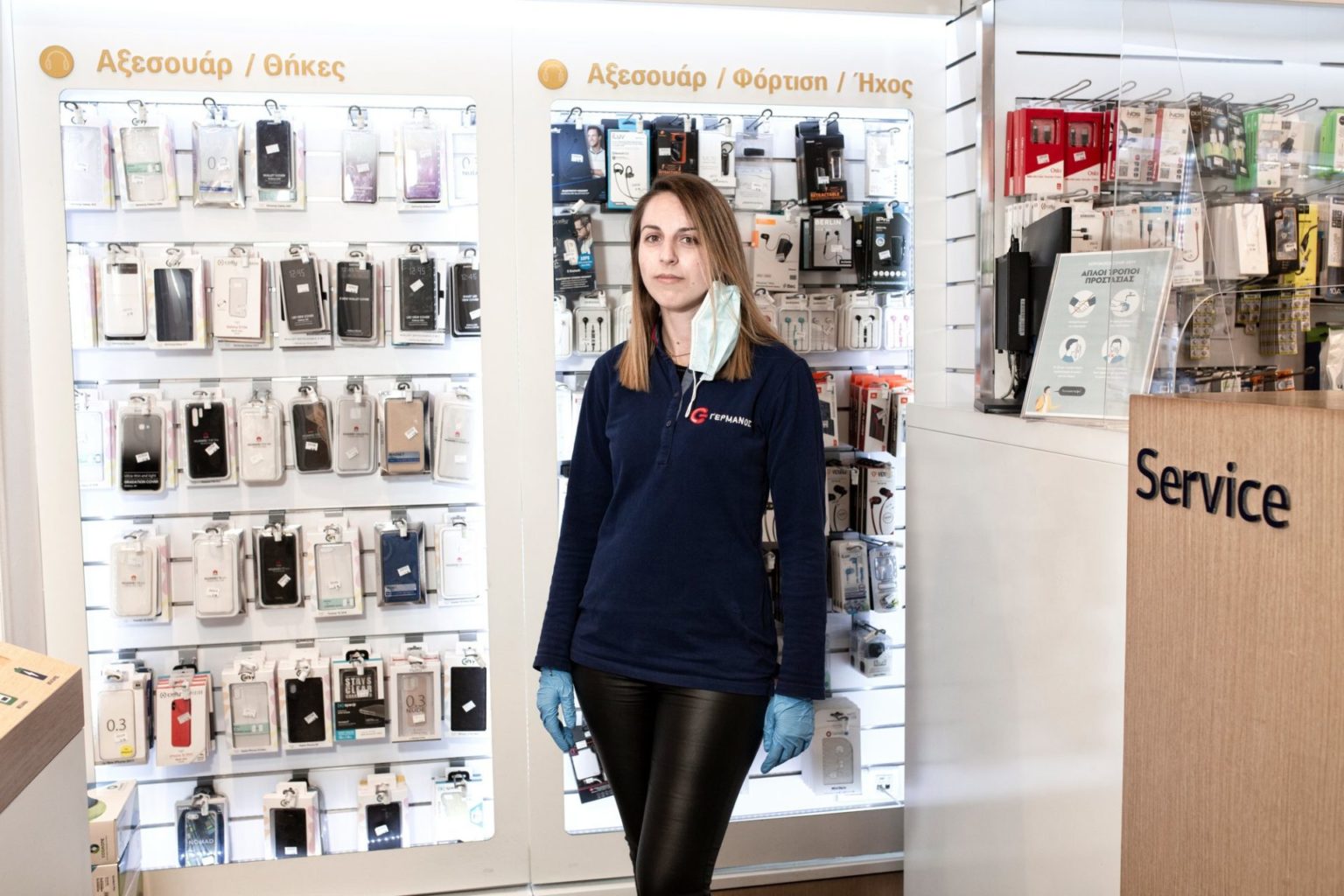
Lena Mimigianni, 33 y.o., employee at a mobile telephony shop for 15 years.
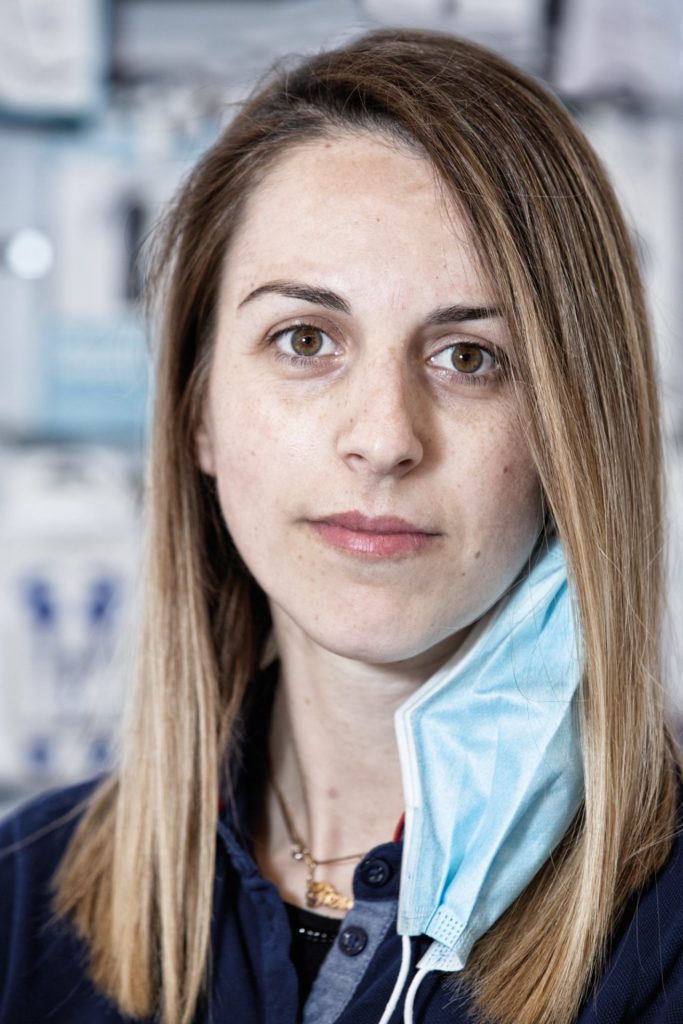
“My life has changed so much with the epidemic; I’m scared, but since we’ve taken all necessary measures Ι get by”
Lena Mimigianni, 33 y.o., employee at a mobile telephony shop for 15 years.
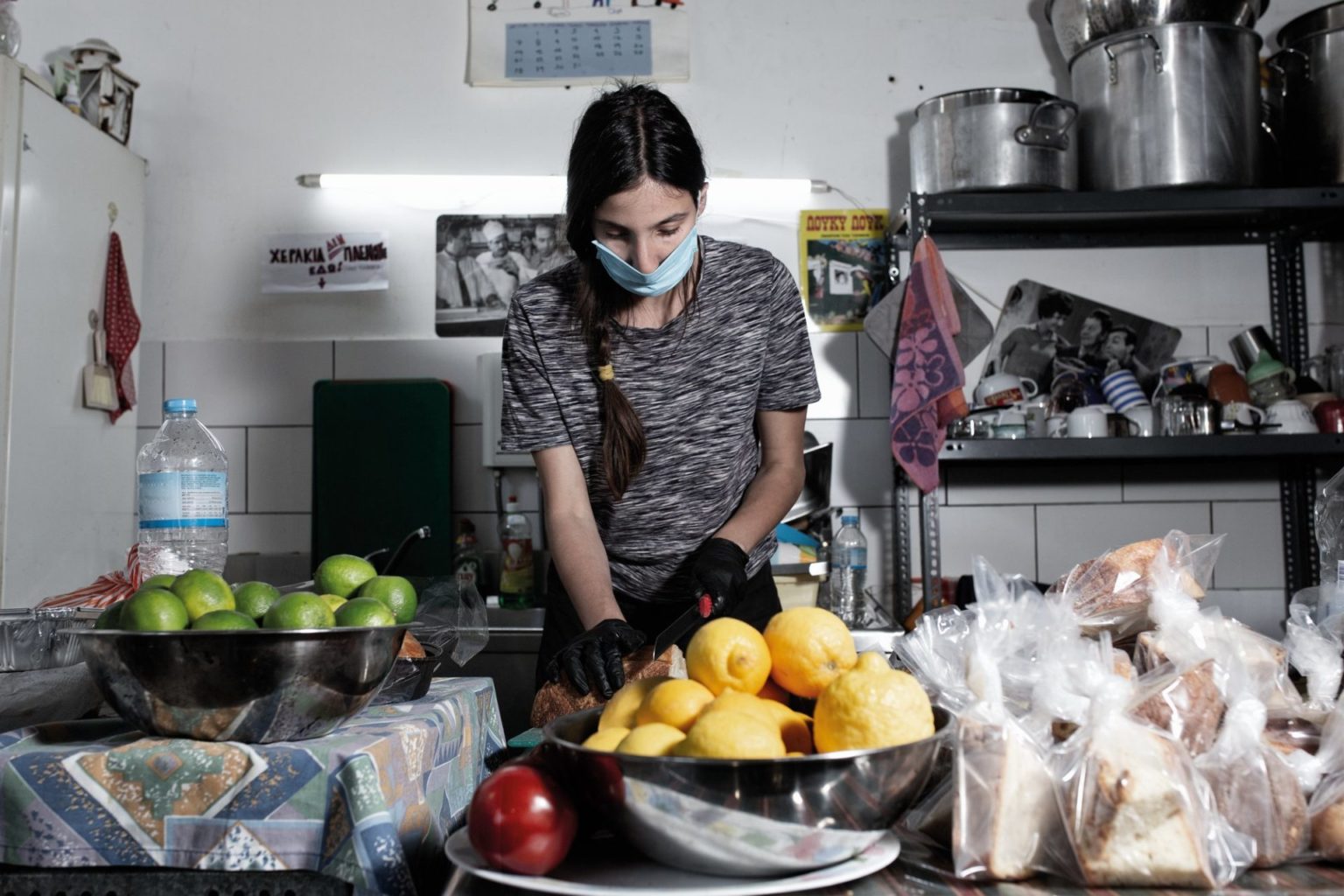
“I’m not afraid I might get infected (sick); to me, what’s most important is to help people who really need it”
Eleni Pipini Troupaki, 23 y.o., student, volunteer at the social soup kitchen “O Allos Anthropos”, has been working for the last 15 days.
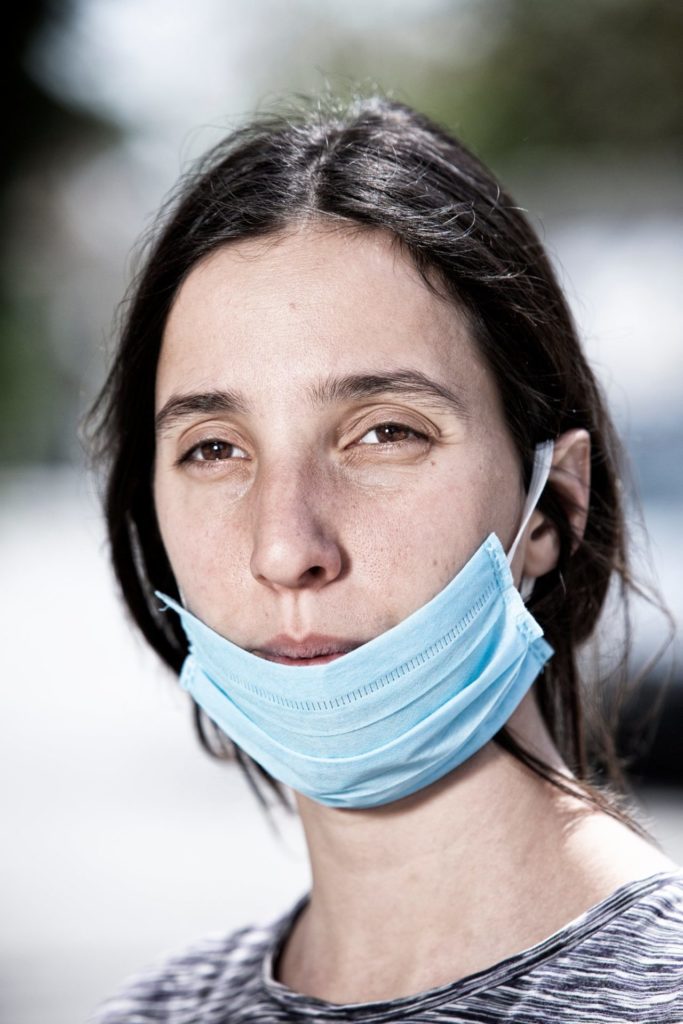
“I saw in the social media that they needed volunteers and so I volunteered. Here people create very strong bonds and you can practically see the results of the effort you make.”
Eleni Pipini Troupaki, 23 y.o., student, volunteer at the social soup kitchen “O Allos Anthropos”, has been working for the last 15 days.
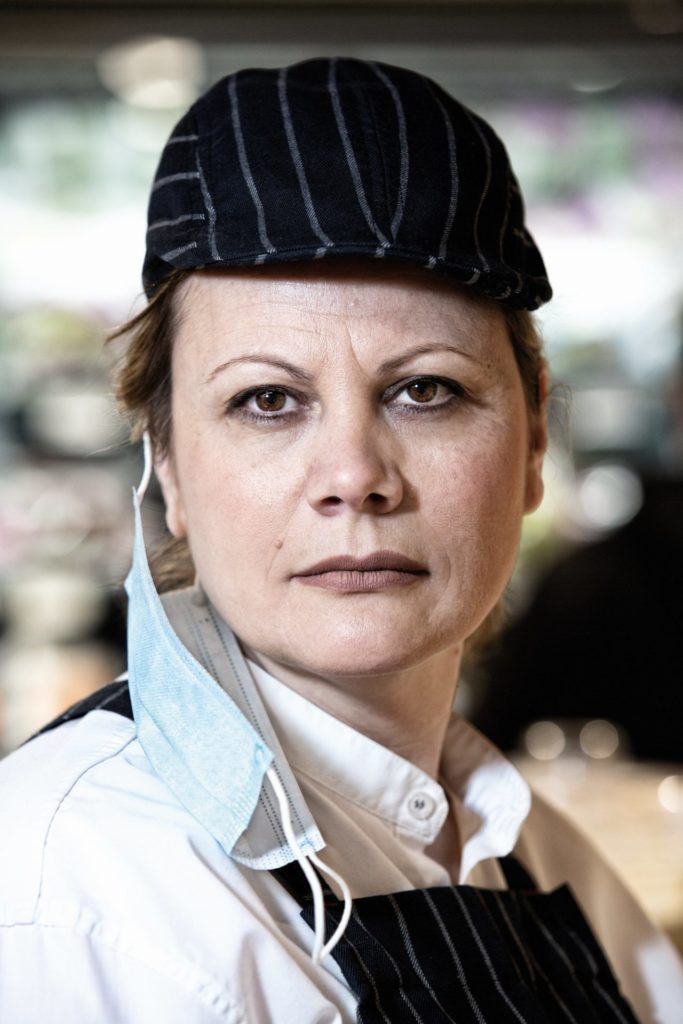
“During the covid epidemic, customers visiting the supermarket have multiplied”
Mailinta Zoe, 45 y.o., supermarket employee for 11 years.
Married mother of two.
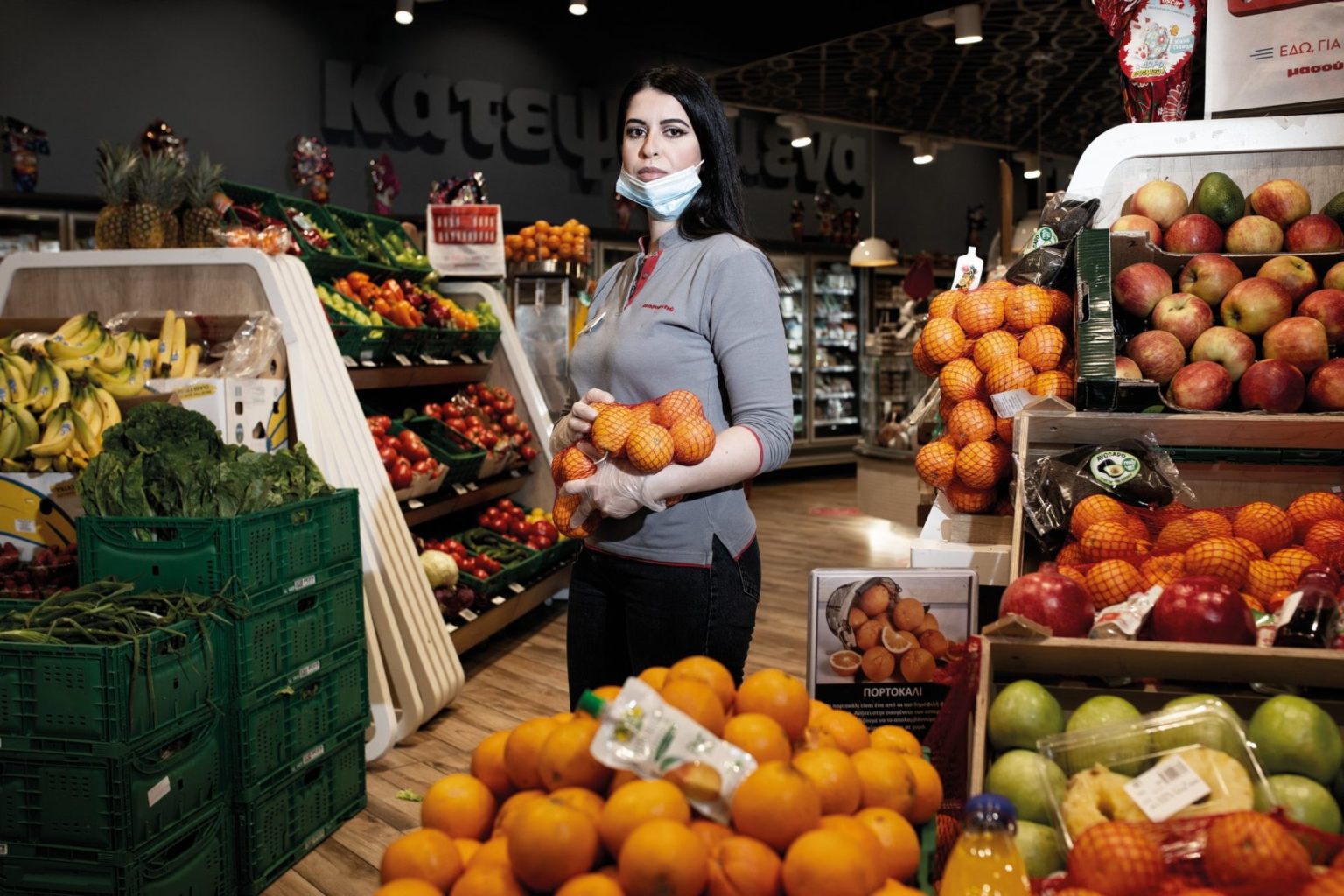
“In the first week I was very scared, but after we applied the safety measures and given their effectiveness I feel all right now”
Kyriaki Logothetidou, 29 y.o., super market employee for 4 years.
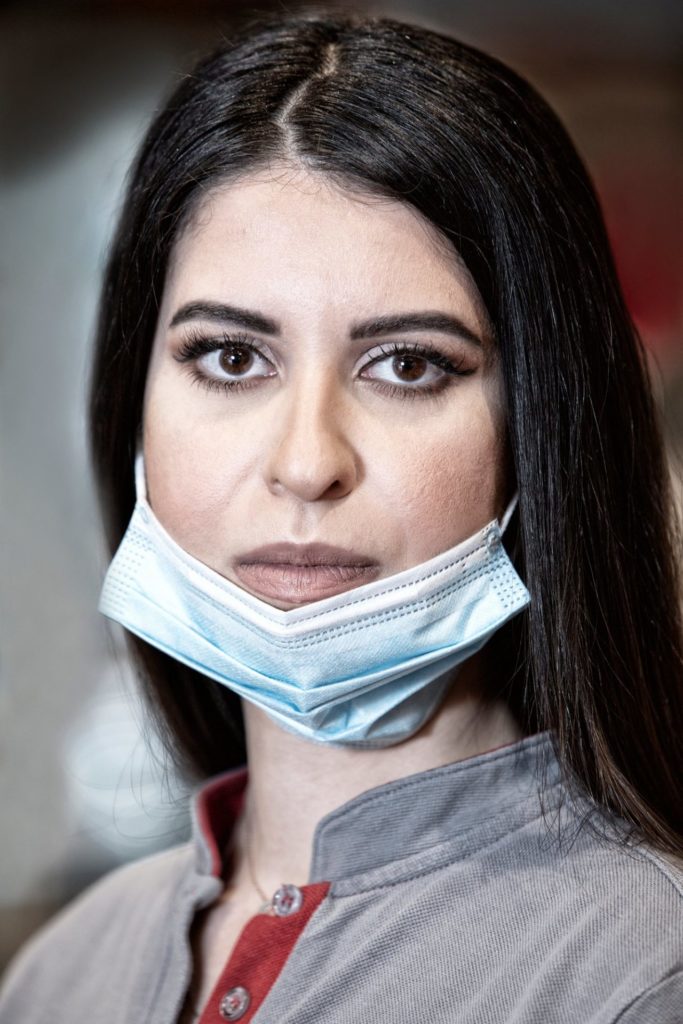
“Amid the pandemic, it is very important to cater for people's diets; it makes you feel like a super-hero!”
Kyriaki Logothetidou, 29 y.o., super market employee for 4 years.
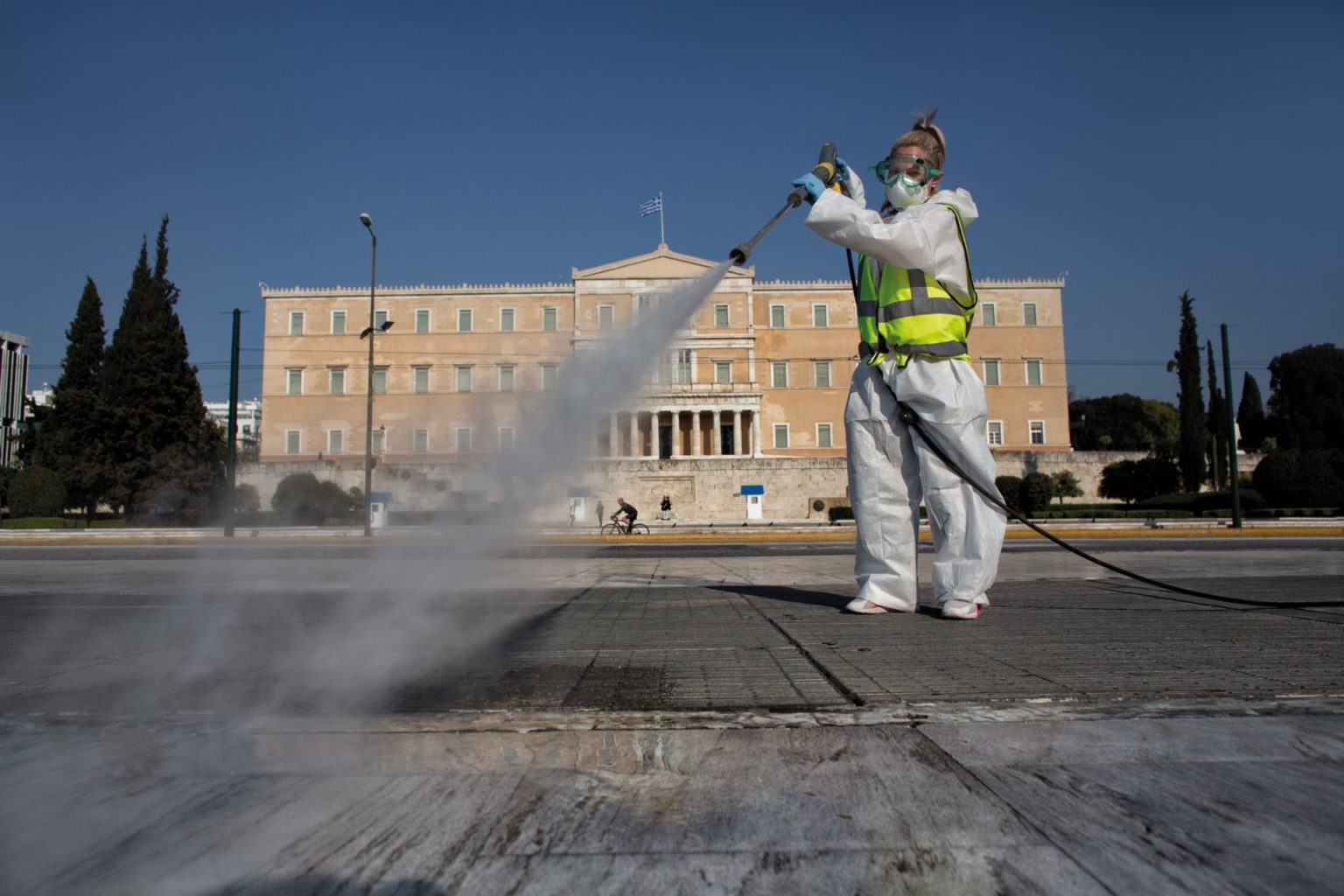
“I feel proud to be a part of the campaign against the spread of covid”
Nikoletta Iliopoulou, 34 y.o., Municipality of Athens Disinfection unit.
She was appointed at the municipality two years ago, under the procedure of the Supreme Council for Civil Personnel Selection (ASEP). She is married, with three children.
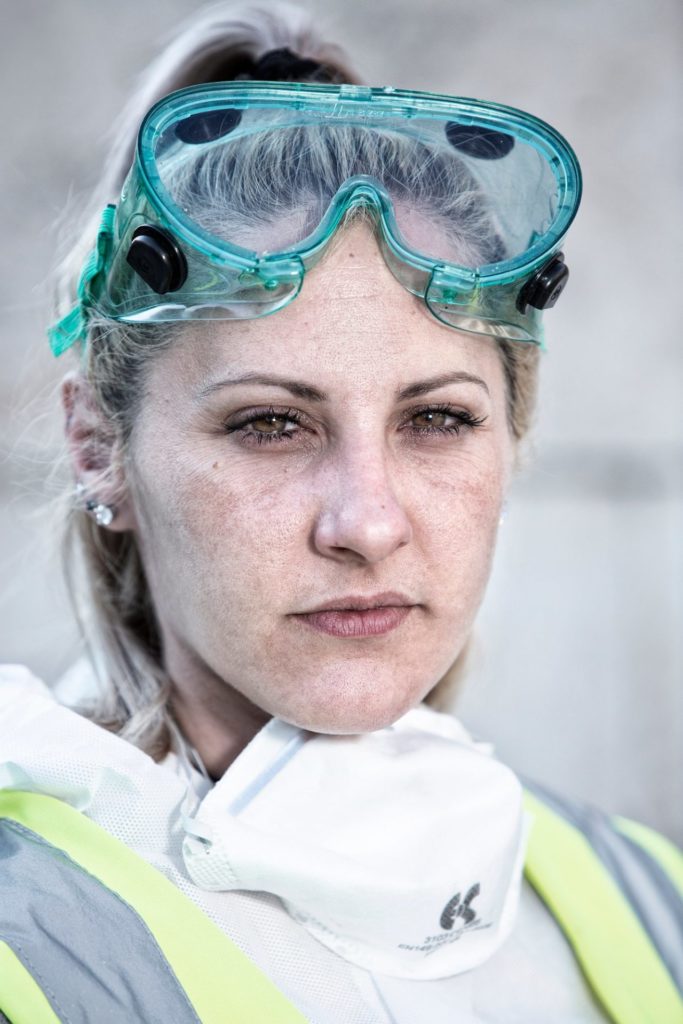
“I have never felt more useful in my life”
Nikoletta Iliopoulou, 34 y.o., Municipality of Athens Disinfection unit.
She was appointed at the municipality two years ago, under the procedure of the Supreme Council for Civil Personnel Selection (ASEP). She is married, with three children.
When asked who stays with the children, she answered:
Unfortunately, I have nobody to stay with them as my husband works too, so I have to leave them home alone. I am lucky, because they are late risers and I work on the morning shift.
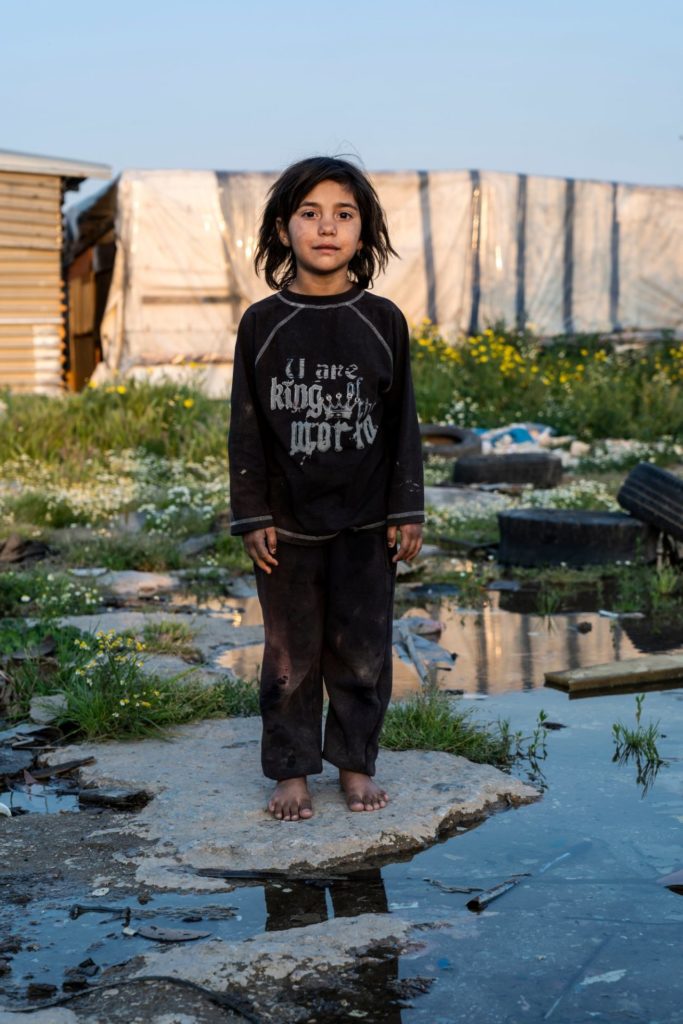
“Will you get me a bag? And pencils to go to school!”
Panagiota doesn’t know exactly how old she is. She says she is five or maybe six. Moreover, she has never gone to school. She lives in the Roma slums of Nea Zoi in Aspropirgos with her deaf grandmother. She plays barefoot in the muddy waters and the rubbish of the slum and dreams that, some day, someone will give her a bag and pencils so that she can go to school too.
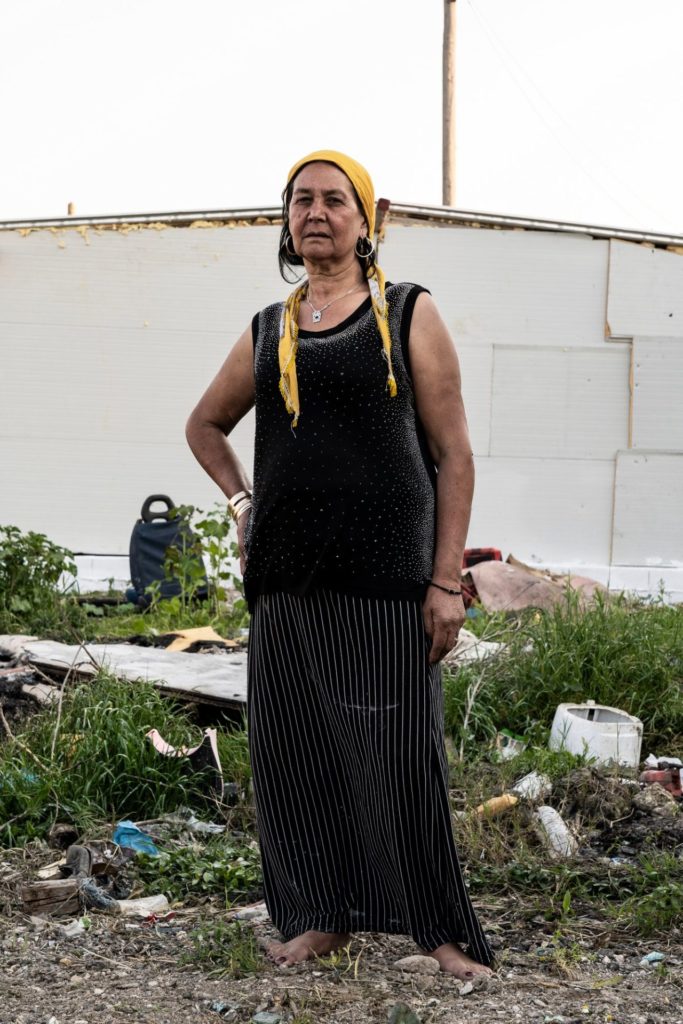
“Nobody ever comes here. Now, with the coronavirus, we will die like flies, forgotten. It is our fate to live next to the landfill and in the trash”
Angeliki Papadimitriou is 59 y.o., diabetic. She lives with her husband and her great-grandchildren in the Roma slums of Nea Zoi in Aspropirgos. Because of the lockdown, no one can go to work and face a serious problem of survival.
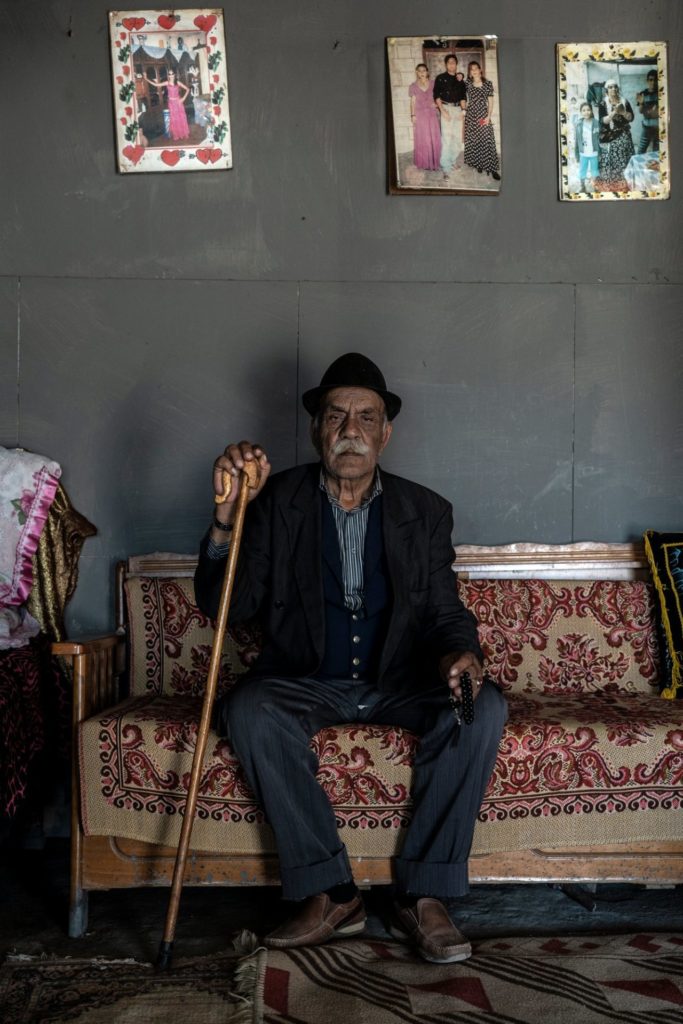
“What are we going to do now that we can't go around for scrap? Where are we going to get food from? I don’t know why we stay in and what this disease is all about. Nobody has come here to help us. Nobody has told us anything. All we know is what we hear on TV. We are scared”
Panagiotis Tsiriklos was born in 1943 in Theva. About 15 years ago, he came to Nea Zoi in Aspropirgos, thinking that the capital would offer more opportunities for himself and his ten children. He was wrong.
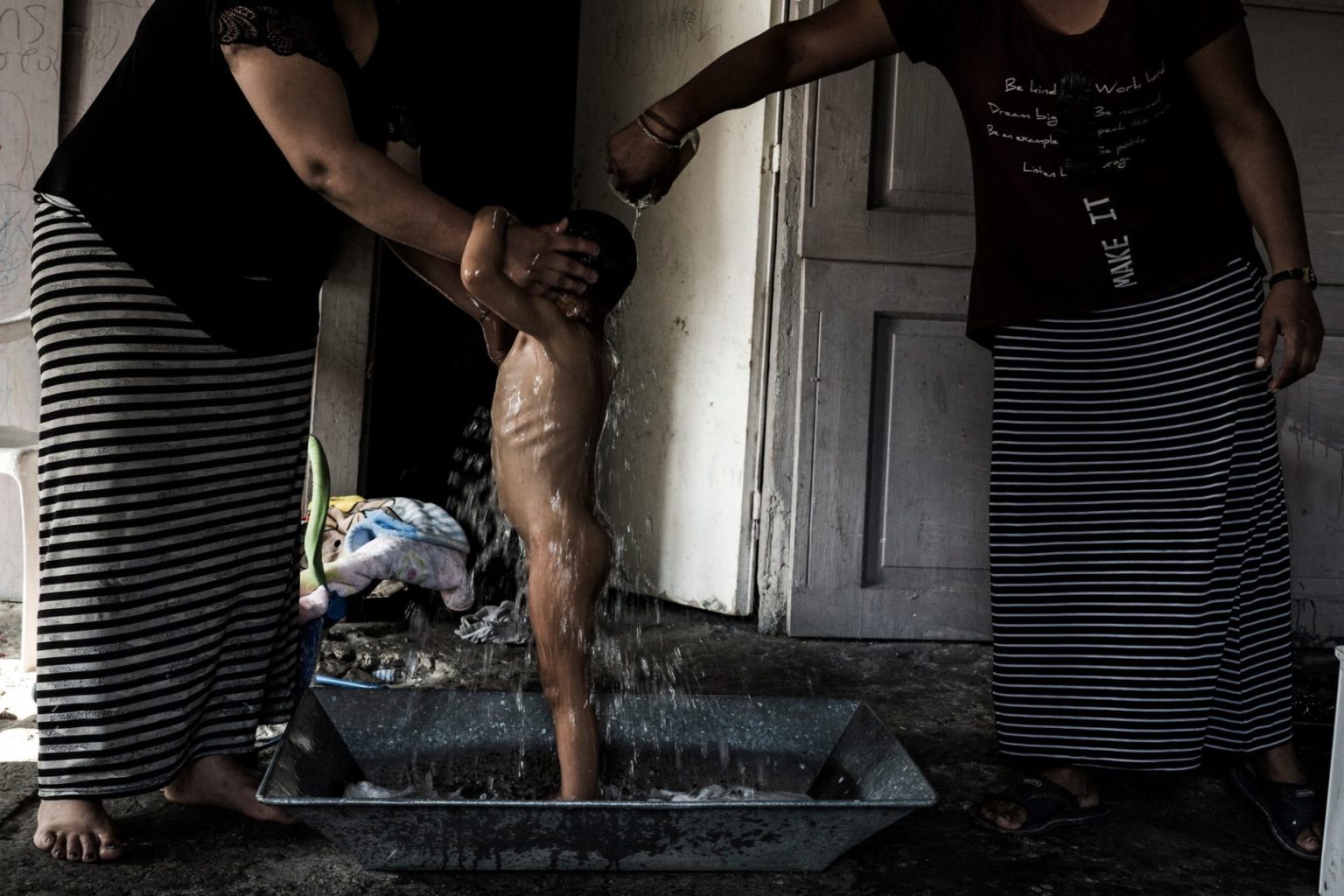
“We try to do what they tell us to on the telly. We try to be clean. But what can you do? Look down, the shack has no cement. So what if we wash ourselves? A moment later we are covered in dirt again”
Maria Dionysopoulou has two children and lives in a shack made of concrete blocks, wooden beams and polyester sheets in Nea Zoi of Aspropirgos. Every night, she heats water on the camping stove, moves a tub in the middle of the shack and bathes her children.
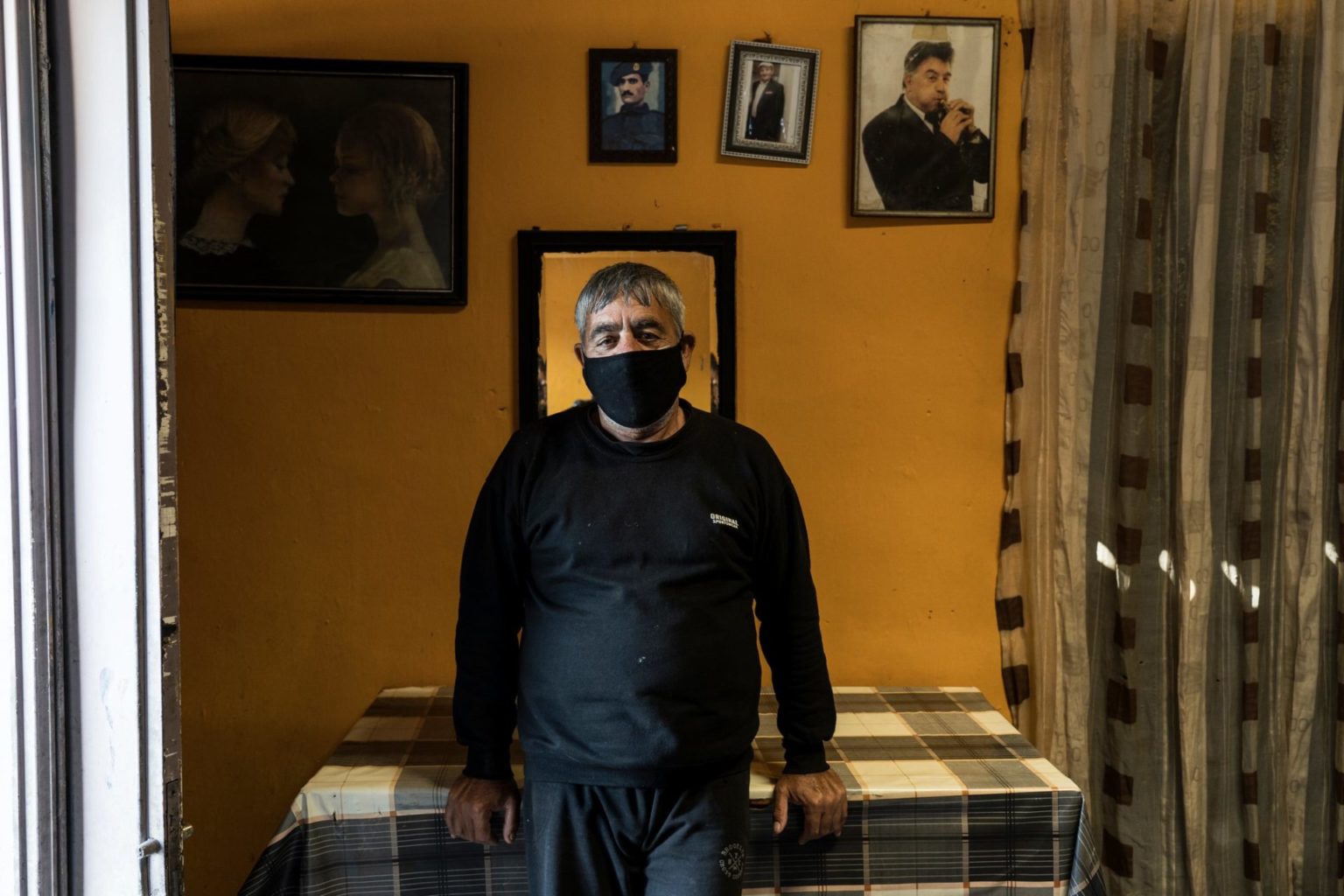
“I am a diabetic and I’m scared I may get this damned disease. What do we eat everyday? Just bread.”
In the last month, twice a week, Mpampis Mpekos wakes up at 3 in the morning. He wears his cloth mask and gets in the car, heading for the centre of Athens. There, a baker gives him the bread that was not sold in the previous days.
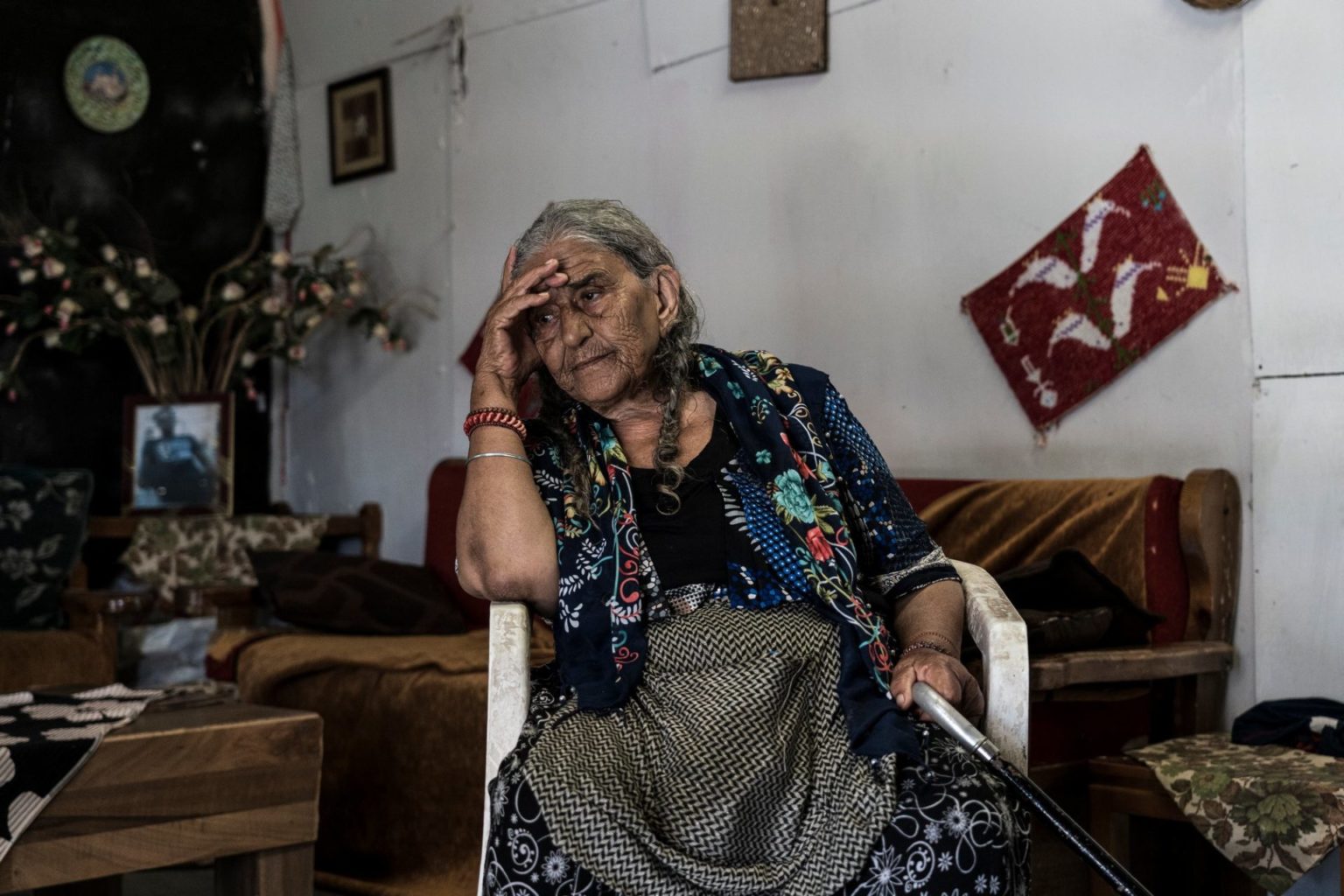
“If he gets the disease, what am I going to do with him? How am I to take him to the hospital? No ambulance or doctor ever gets to Nea Zoi”
Georgia Halilopoulou, 88 y.o. today, came from Thiva to Nea Zoi in Aspropirgos, with the hope of a better life. She is not so much worried about herself, as she is for her son who had been suffering from asthma attacks over the last year.
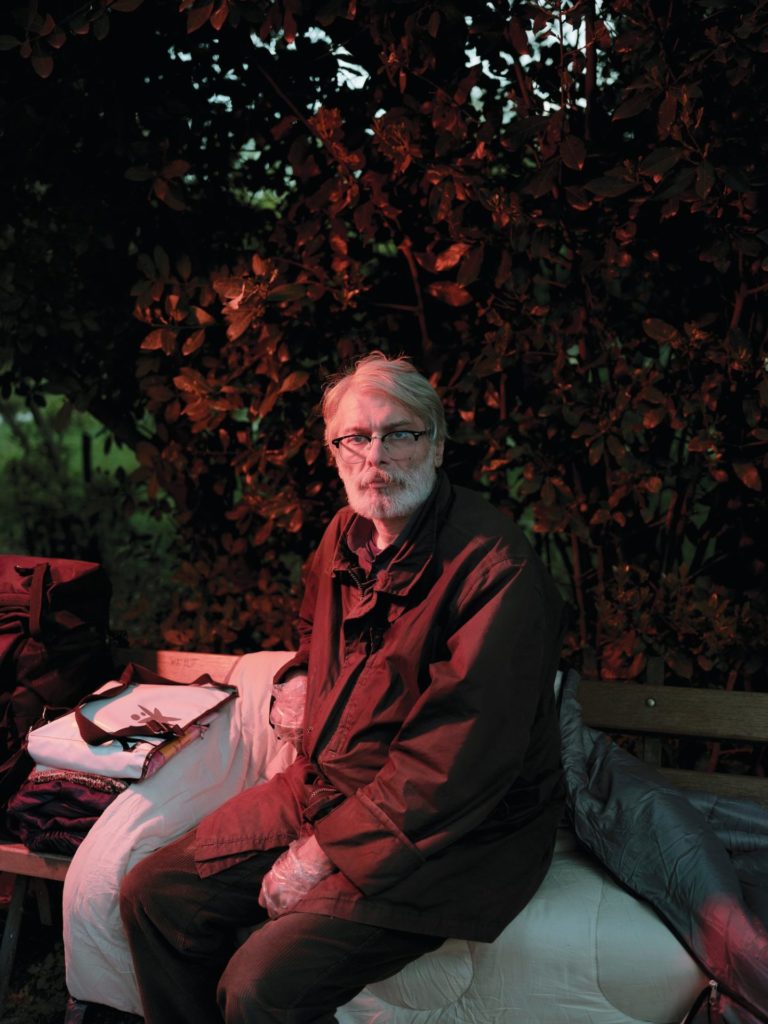
“I take a bath every Friday”
Yousef Danesh, Refugee – Homeless – Mathematician
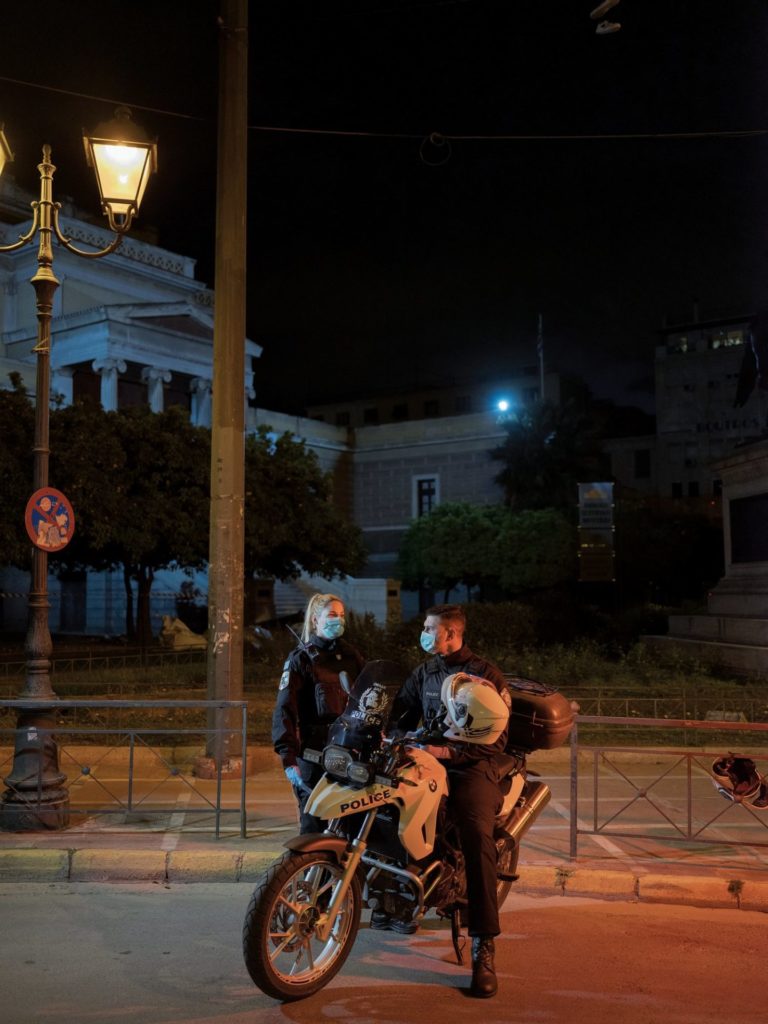
“We are more cautious; we keep washing our uniforms and gloves and this is something that we weren’t doing as often in the past”
Ioannis Perdikas & Kalliroe Haskou, DIAS Unit Police Officers
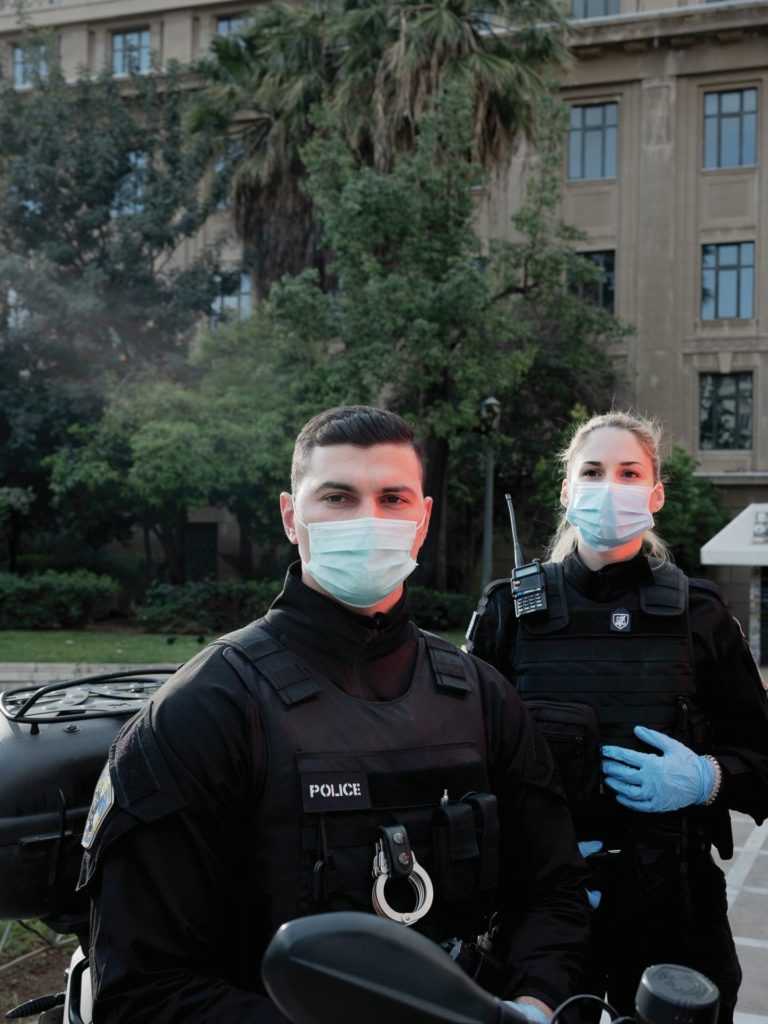
“The psychological burden is big for us too”
Ioannis Perdikas & Kalliroe Haskou, DIAS Unit Police Officers
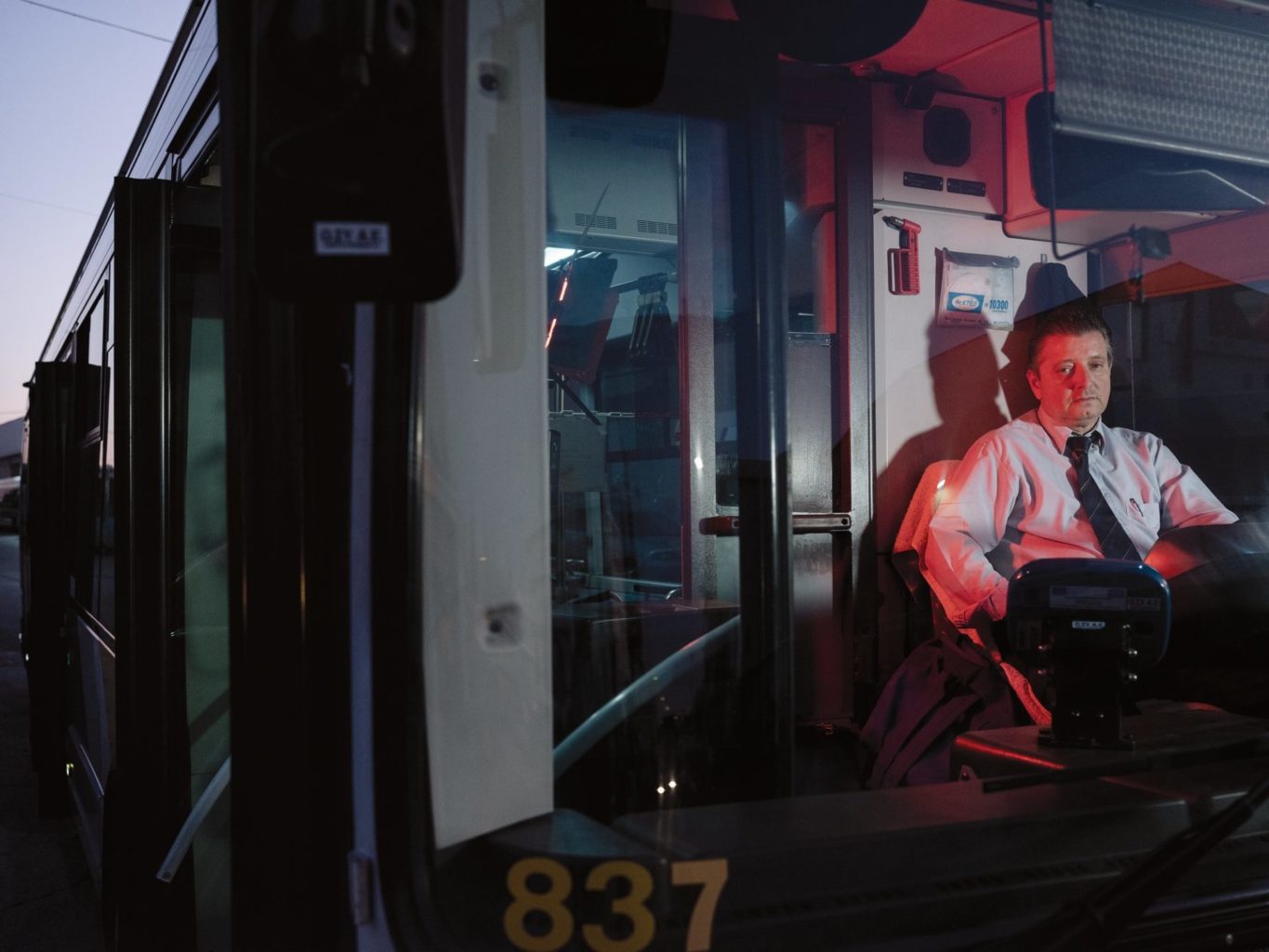
“Now we are driving through an empty city that has no life”
Thodoros Kepeleris, Athens Public Transport Organisation (OASA) bus driver
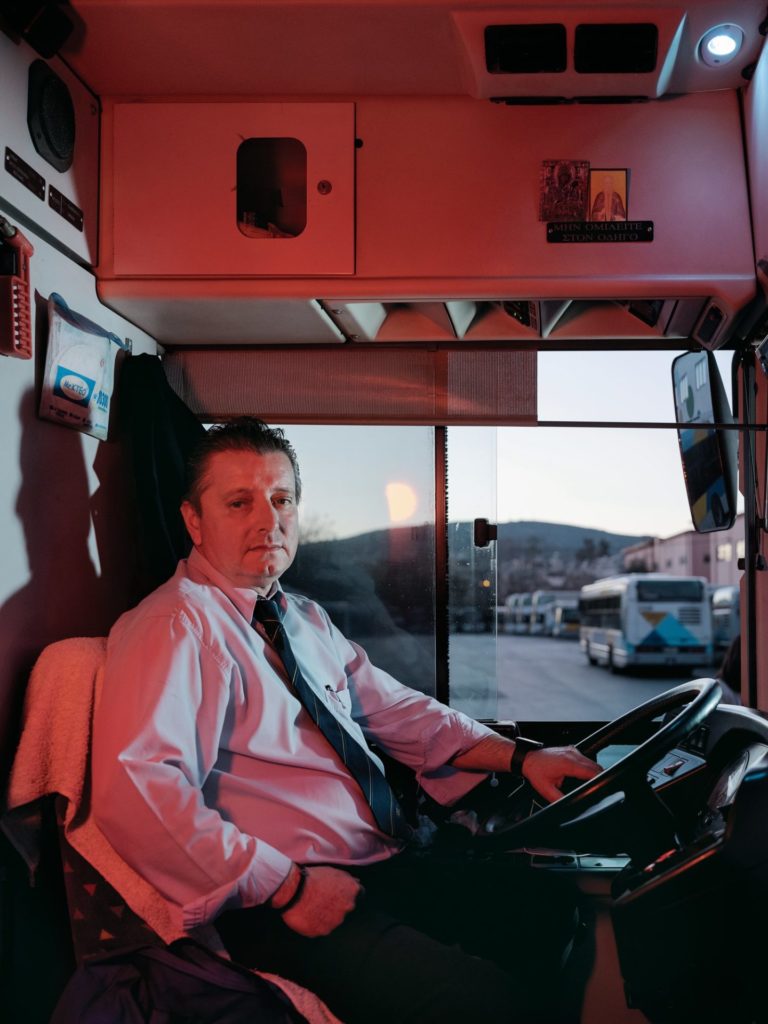
“Life doesn’t end here; we move on”
Thodoros Kepeleris, Athens Public Transport Organisation (OASA) bus driver
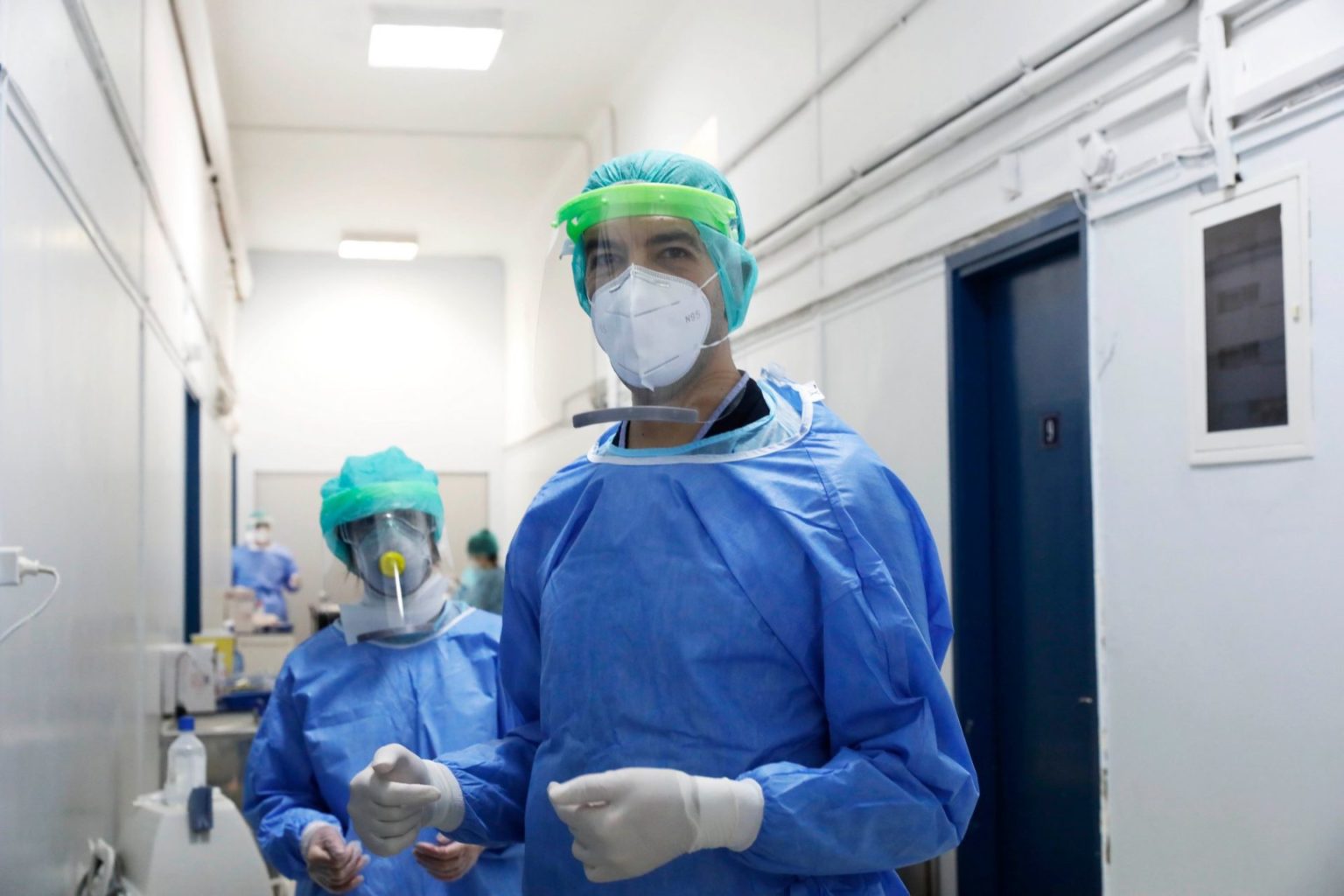
“As I leave the ward, there is no fear and there is no agony; just the feeling that you have done your duty”
Michalis Moutsos, Internist
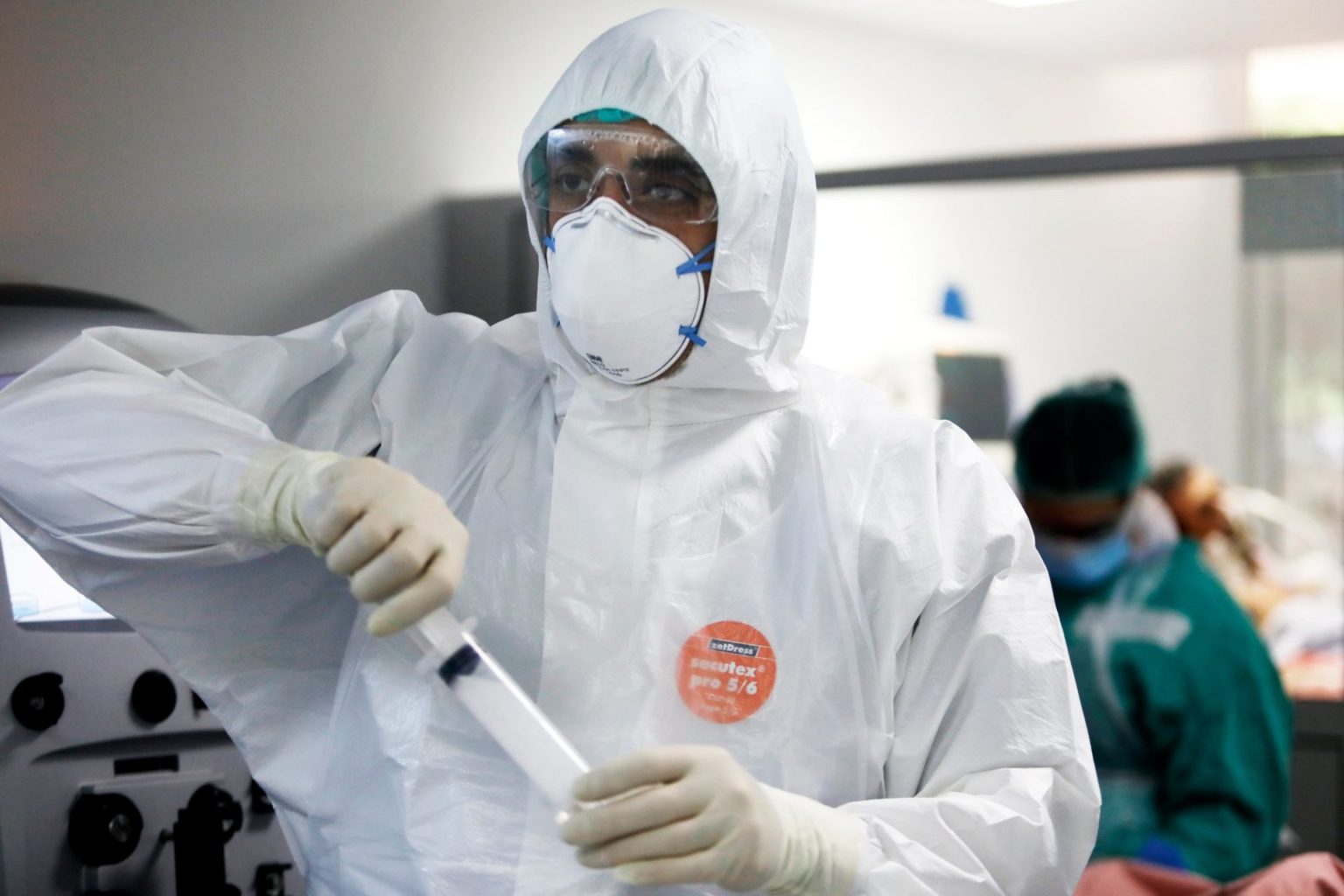
“I am neither a hero, nor do anything special; I’m simply doing my job under slightly harder conditions. That’s all”
Nikos Kakaras – Nurse
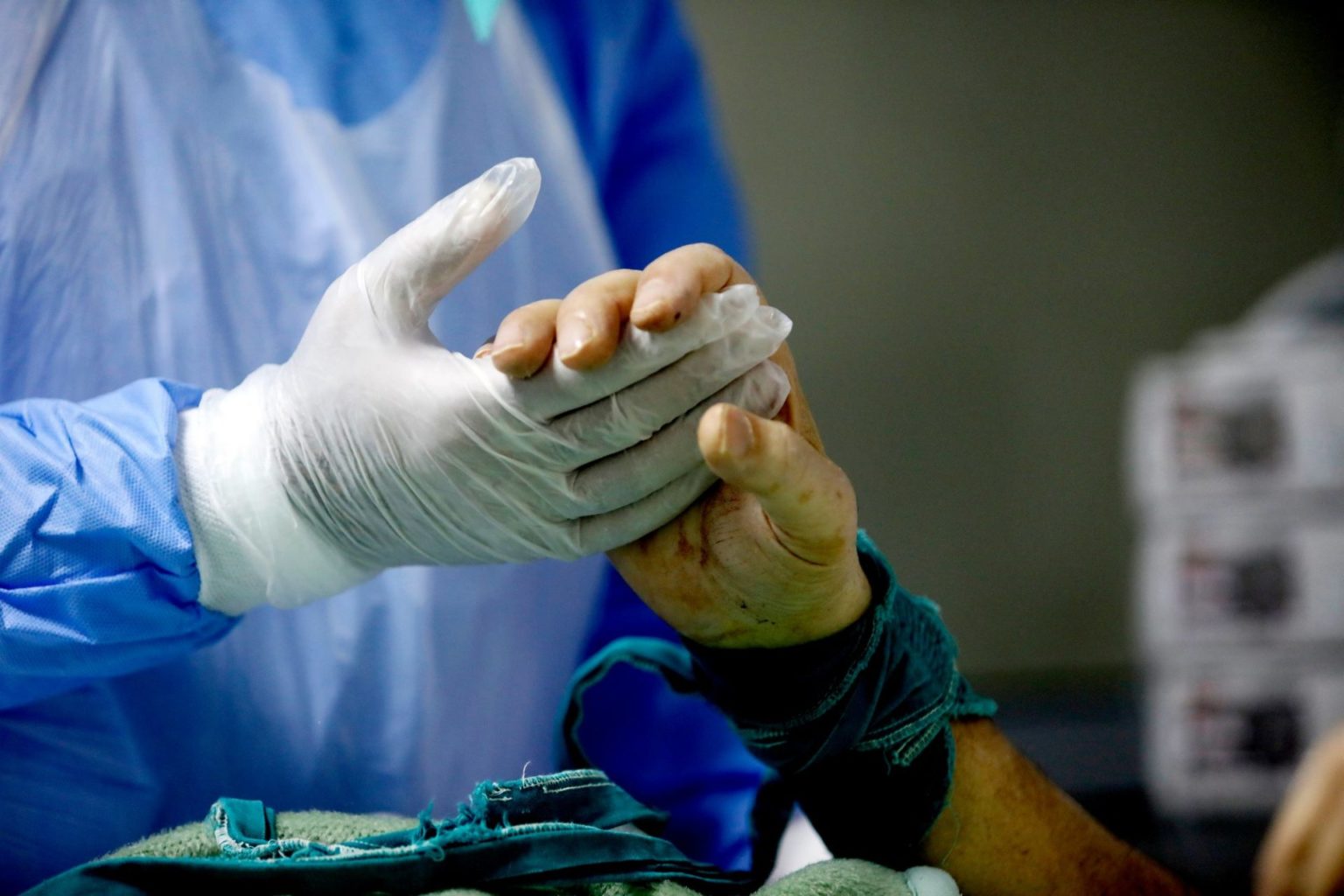
“It looks like a simple clasping of the hand, but it’s so much more. It is the moment that a COVID-19 patient is awakened from sedation. It is the moment when you know that you and your team with stand proudly before the patient and their loved ones. It is the moment that gives meaning to everything you fought for.
A COVID-19 patient is awakened from sedation (people call it “induced coma”) and holds the doctor’s hand tightly.
Kostas Pontikis, Intensive Care Specialist
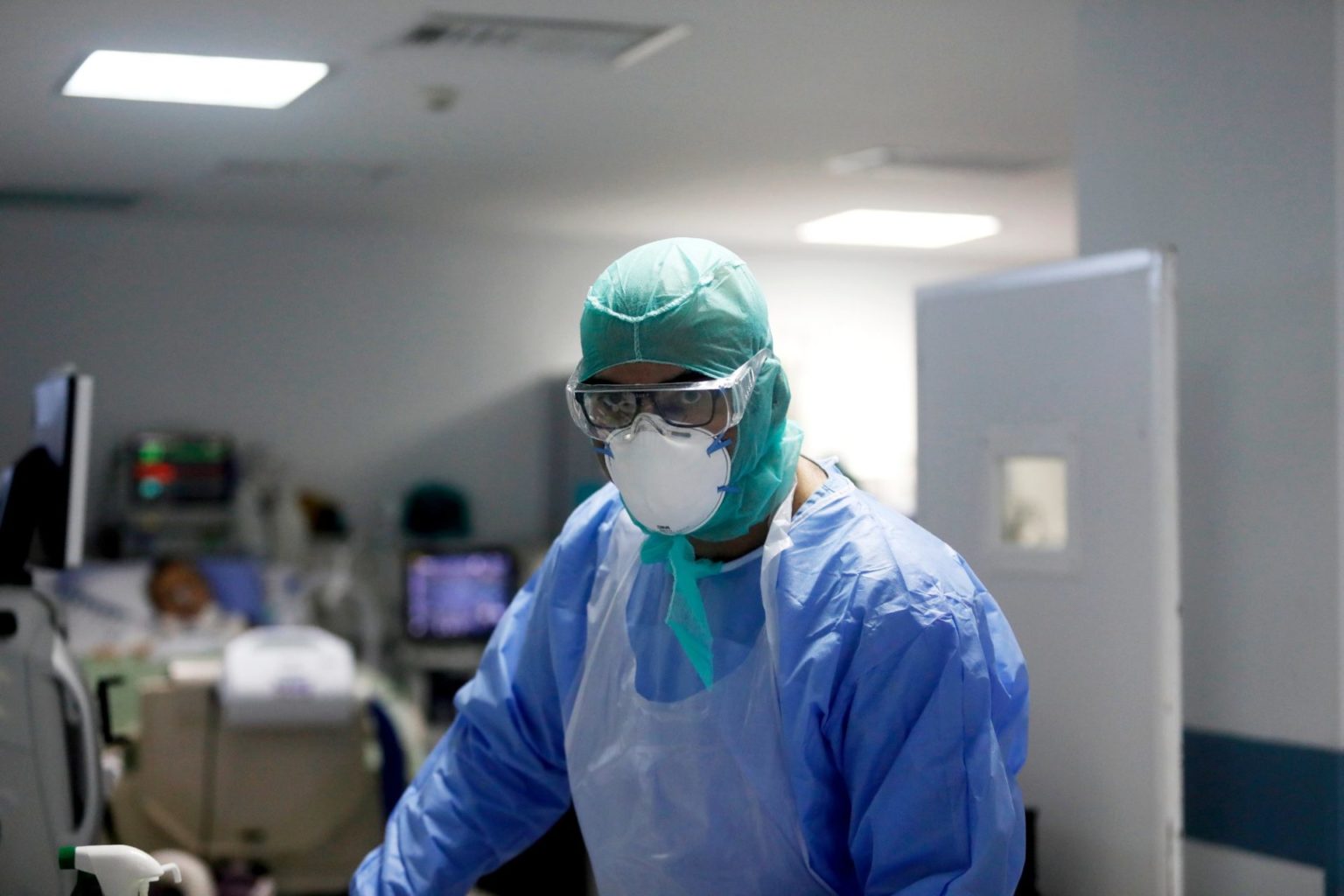
“Sometimes, you know that a patient’s condition is beyond your skills to reverse it. Realistically, this means that may be you should have let go. Yet, you’re still there, fighting. Even you get no direct results, you know that the knowledge gained will be life-saving for others”
An intensive care specialist makes a last attempt to resuscitate a COVID-19 patient, who died a few hours later. He knows that this attempt has negligible chances for success, but feels that this is the least he can do for someone dying – and for himself.
Kostas Pontikis, Intensive Care Specialist
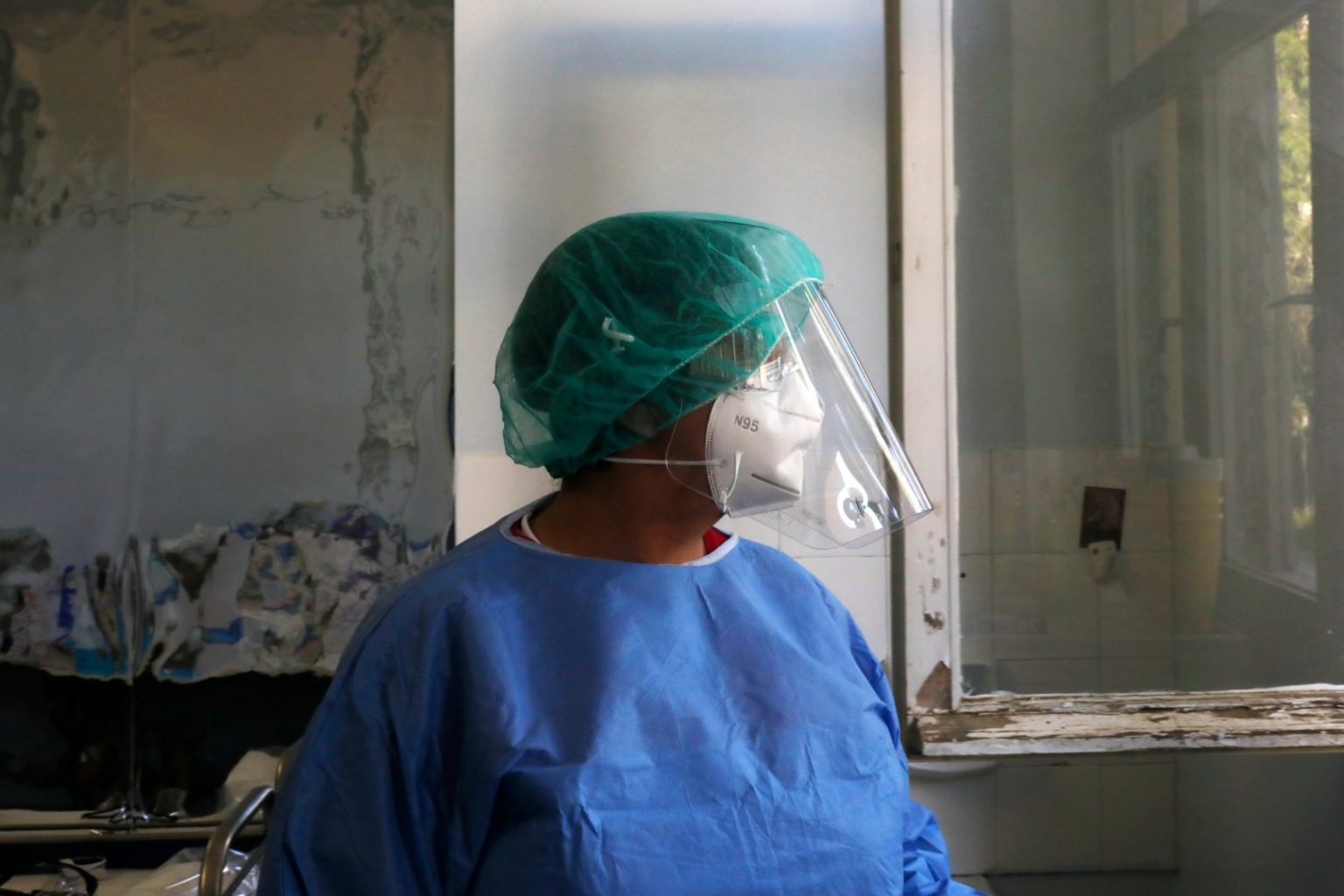
“I’m scared. Yet, you overcome fear when you stand in front of someone who needs your help”
Eleni Kakalou
NHS Doctor
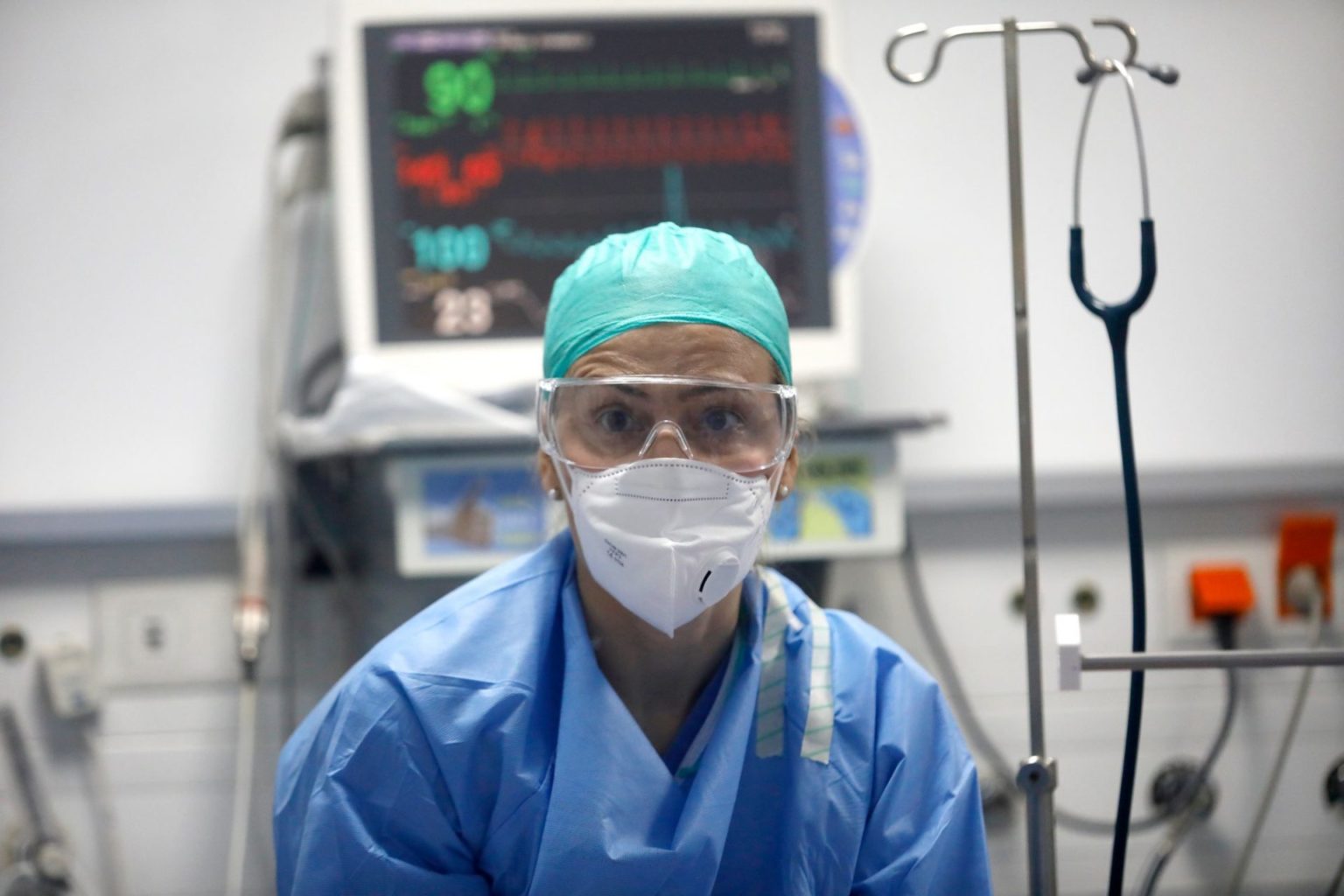
“It’s another day on the front-line for me. It is a battle I have to win for you”
Vaso Chatziara
Anaesthesiologist – Intensive Care Specialist
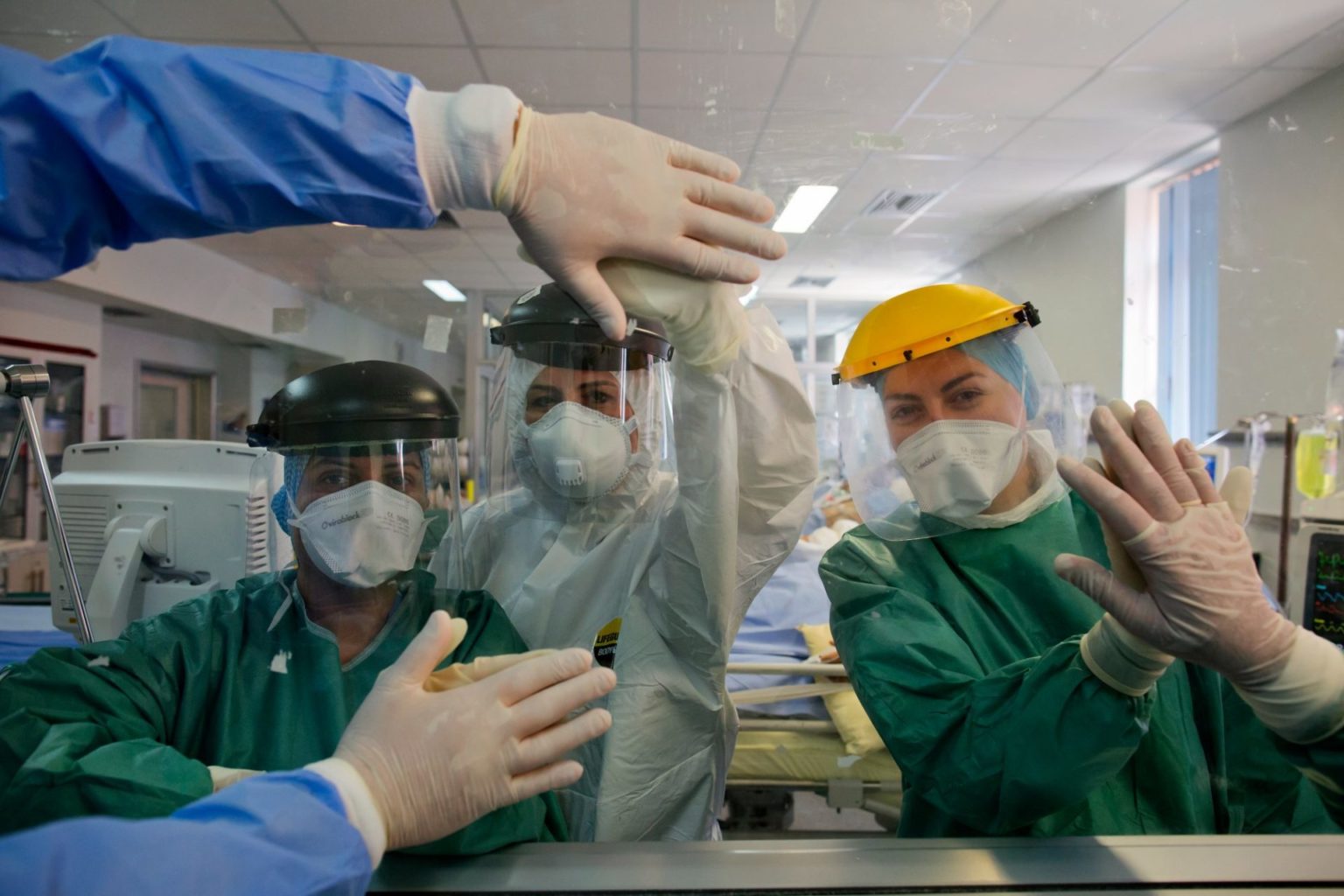
“I will not have a unicellular organism beat me”
Nurses Maria Tsamouri (M), Taimpa-Naz Riaz (L) and Iordana Moskofi (R), pose behind the glass separating the Intensive Care Unit (ICU), touching the hand reflections of doctors Giorgos Dimopoulos (R) and Dimitris Konstantonis (R), at the hospital “Attico” in Haidari, on 15 April 2020. Giorgos Dimopoulos is an intensive care medicine professor at the University of Athens, head of the coronavirus unit at “Attico” Hospital. He is married, with children.
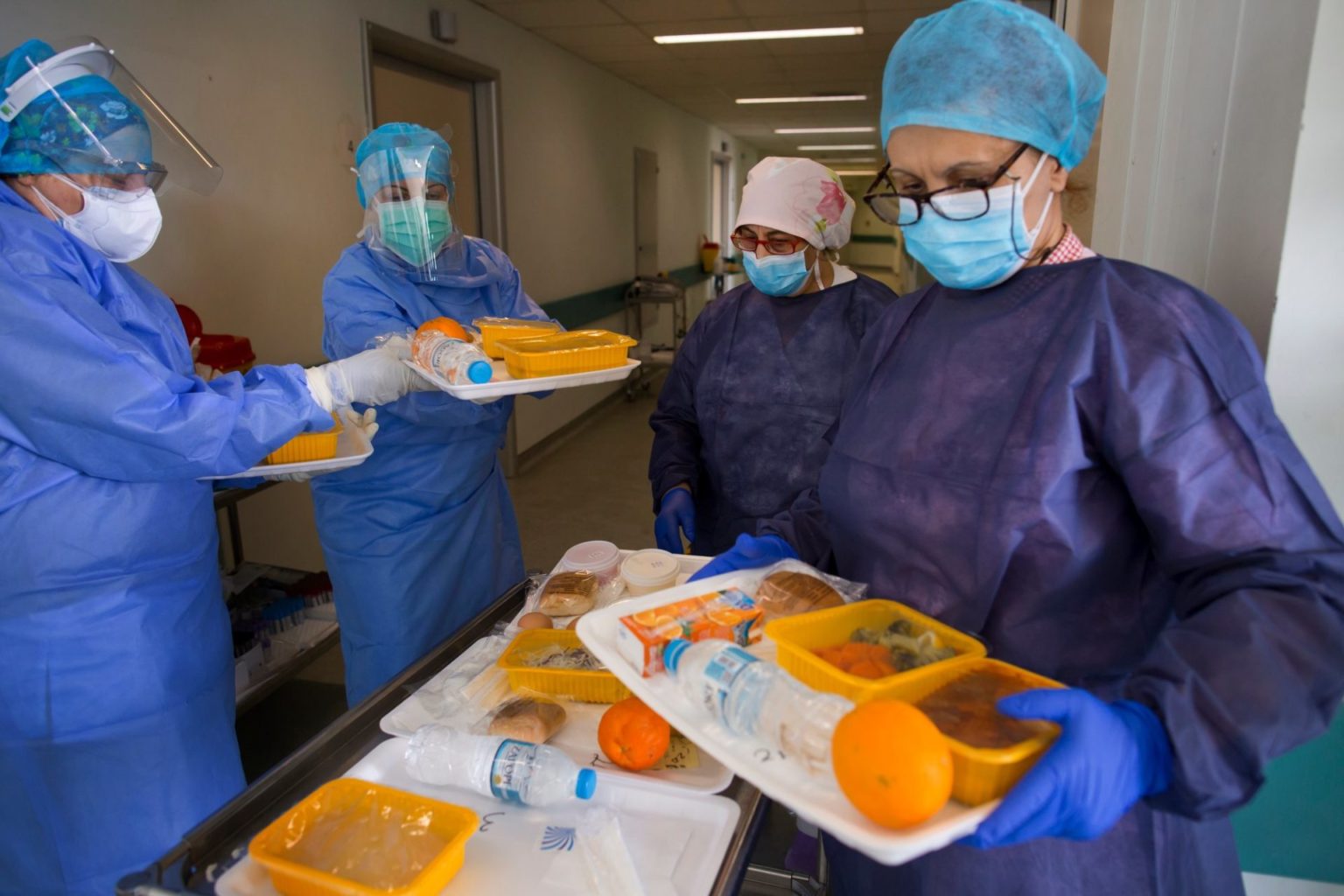
Food service worker Eleni Griva (R), 51 y.o., and nurses serve meals to patients hospitalised for COVID-19 at “Attico” Hospital in Haidari, 15 April 2020. Eleni Griva is married with two children.
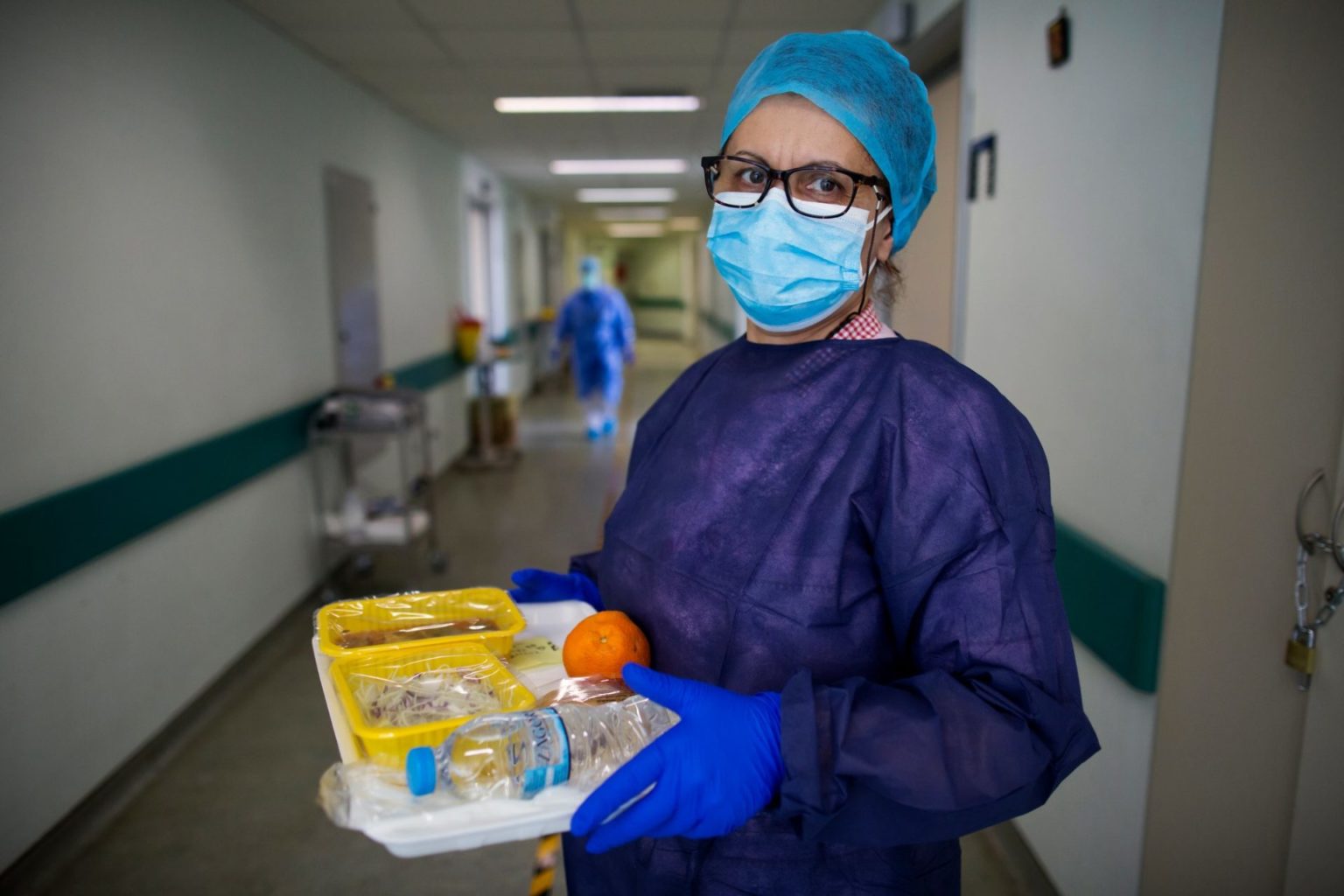
“At first it was uncomfortable, but then we felt really nice as we provide for patients, who have none of their own here; they are completely on their own.”
Food service worker Eleni Griva, 51 y.o., poses in the COVID-19 patient ward, at “Attico” Hospital in Haidari, 15 April 2020. She is married with two children.
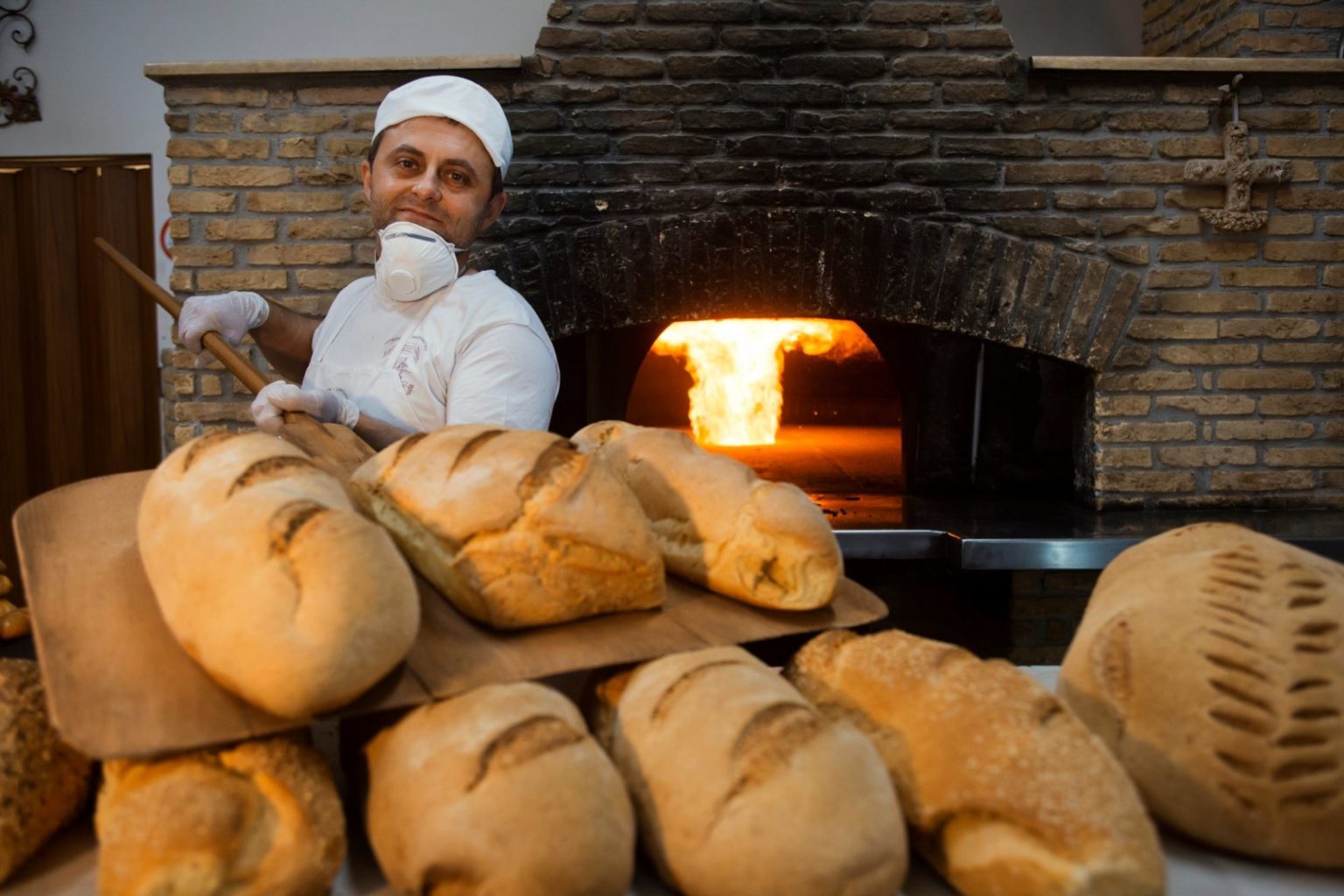
“Our job is hard; it’s more like a “calling”. We are frontline workers, but I can’t stop working for people. There is fear, but one has to go on; bread is a necessity”
Baker Spyros Achmeti, 41 y.o., as he takes bread out of the oven, at his bakery in Kalyvia Thorikou, 13 April 2020. He has been a baker for 22 years. He is married with two children.
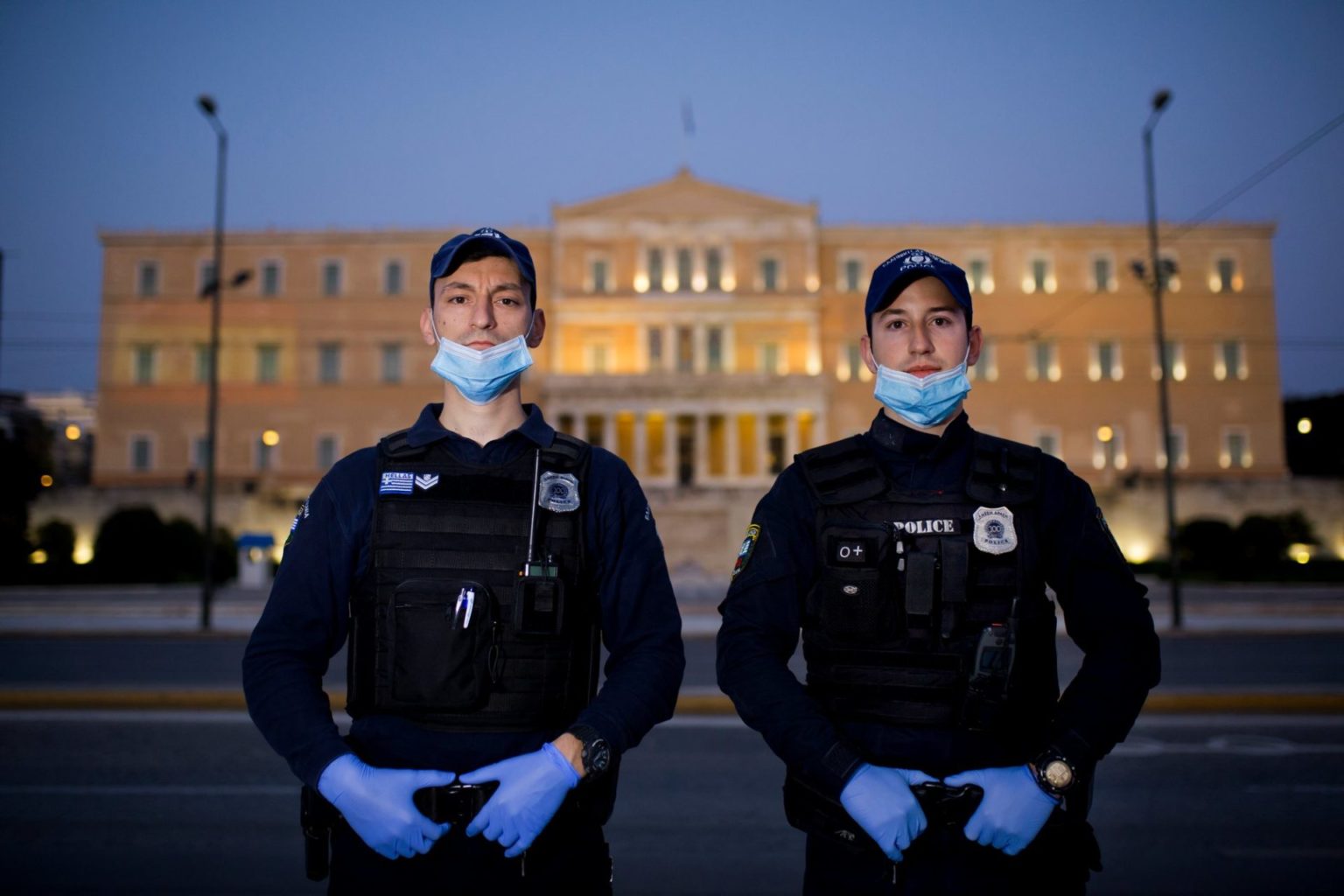
“It's hard to not see your loved ones, your family, or to have to be out to protect them as well as everybody else in Attica”.
Sergeant Stergios Kakarontzas (L), 28 y.o. and constable Charalambos Baylis (R), 26 y.o., pose in front of the Parliament, Athens, 12 April 2020. Stergios Kakarontzas in not married and lives by himself.
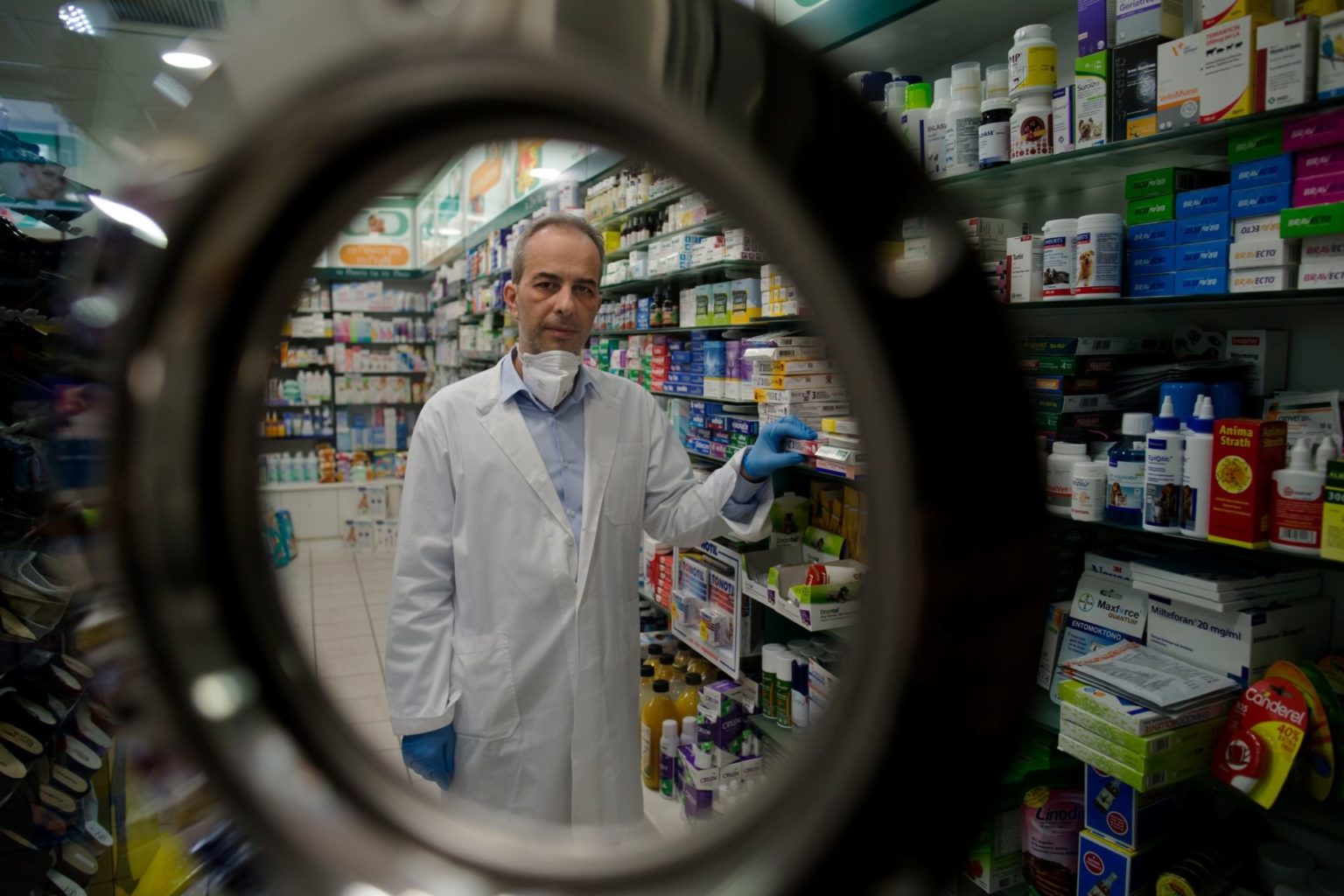
“It’s a huge responsibility: many people depend on me and if I or anyone working here gets infected and I have to close down, these people won’t be able to get their medicines”
Pharmacist Lambros Kouris, 42 y.o., in his pharmacy in Kalyvia Thorikoi, 10 April 2020.
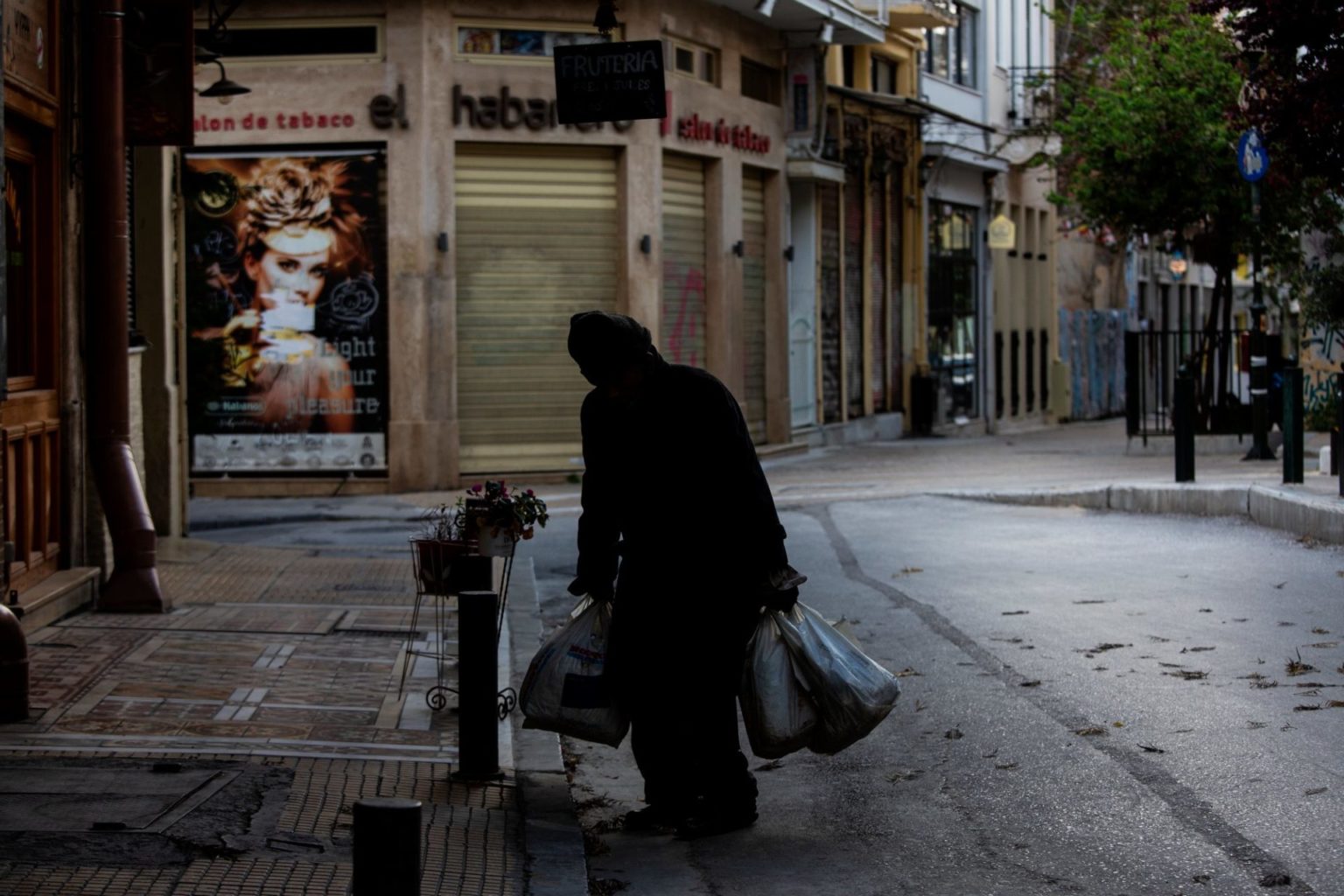
A homeless man carries his belongings in bags, wandering before closed shops in the desolate Psyrri square, during the COVID-19 lockdown, downtown Athens, Tuesday 21 April 2020.
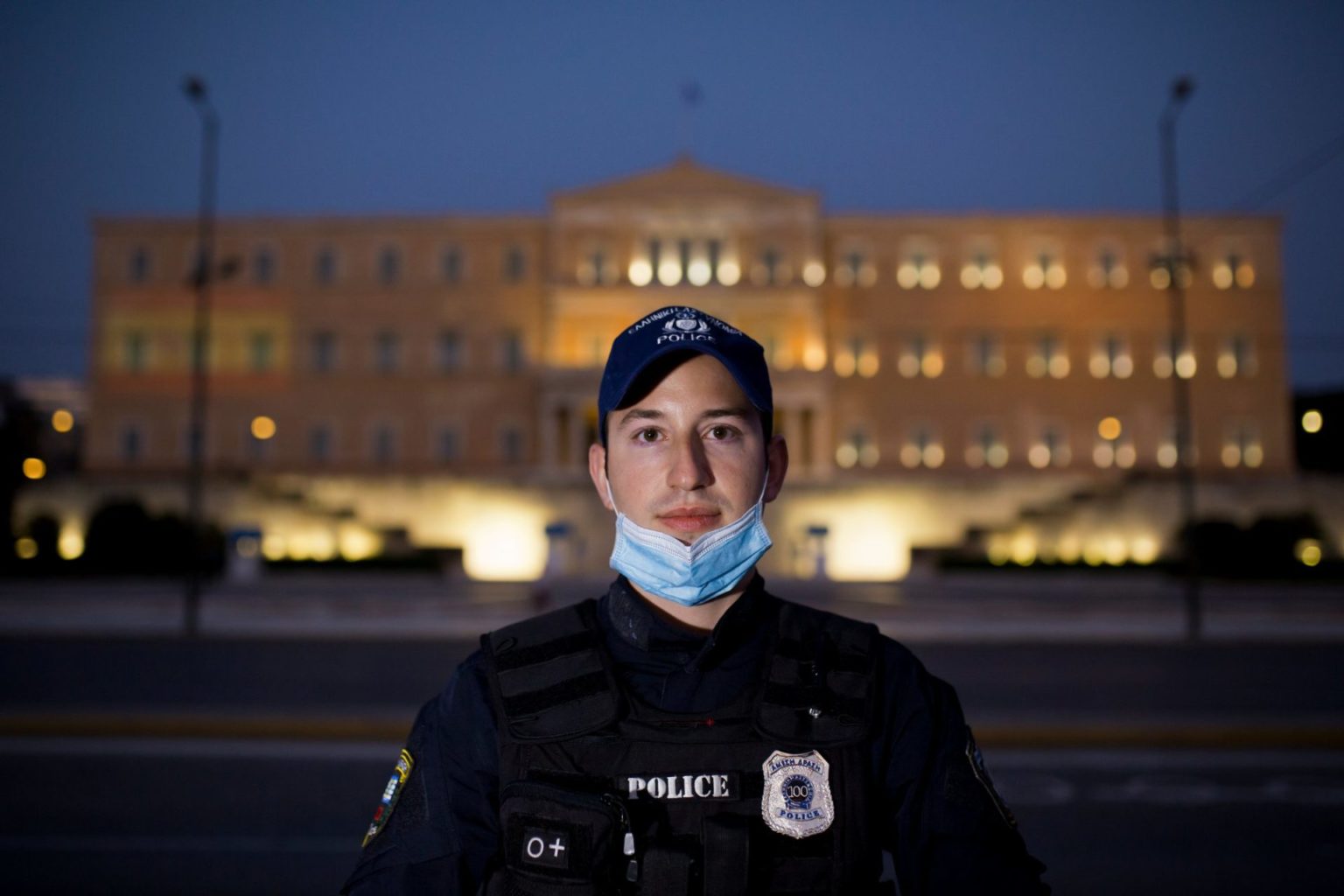
Constable Charalambos Baylis, 26 y.o., poses in front of the Parliament, Athens, 12 April 2020.
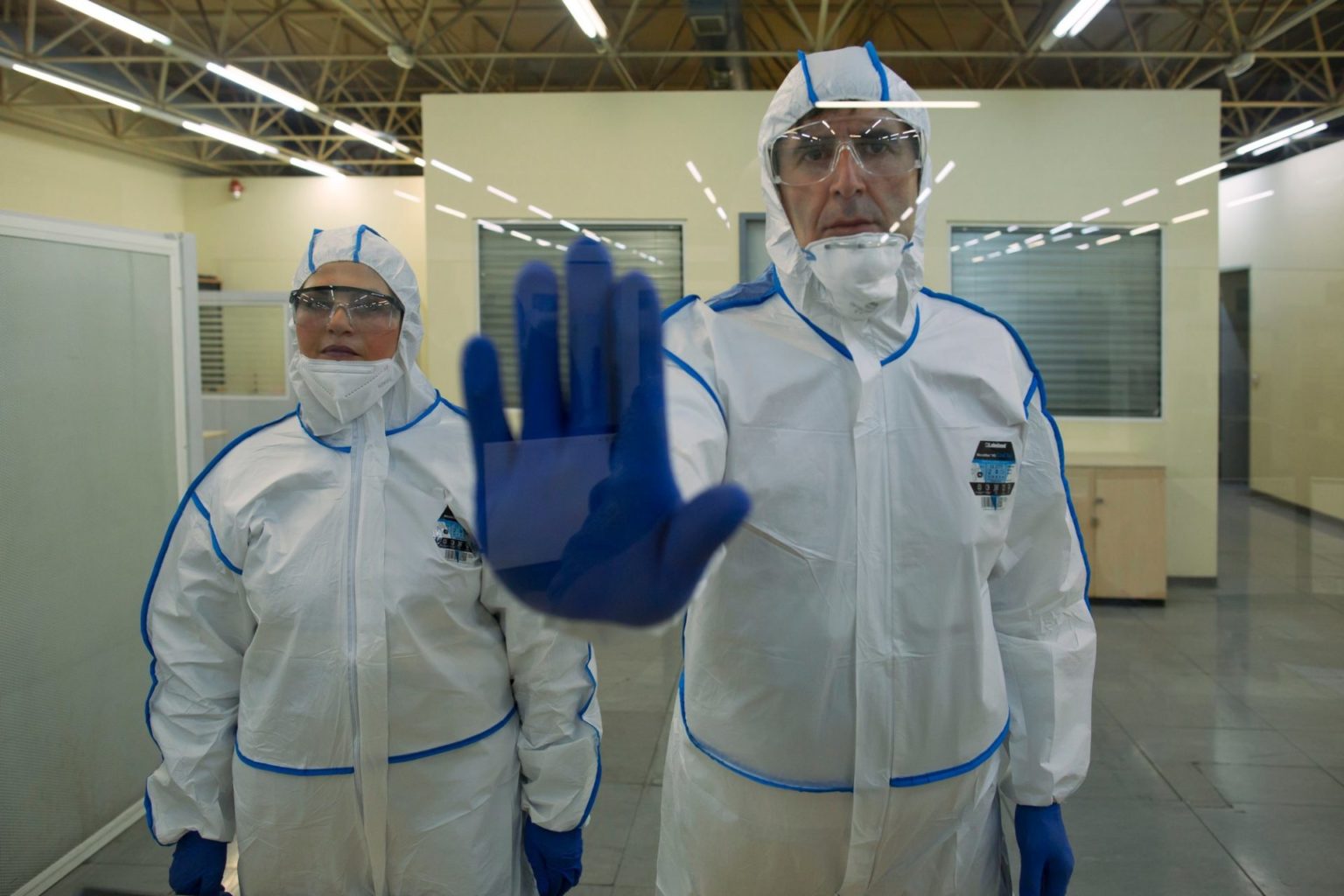
National Emergency Aid Centre (EKAB) Rescuers, Konstantina Papachristodoulou (L), 39 y.o. and Thomas Koulakiotis, 48 y.o., in the operation centre of EKAB, 11 April 2020.
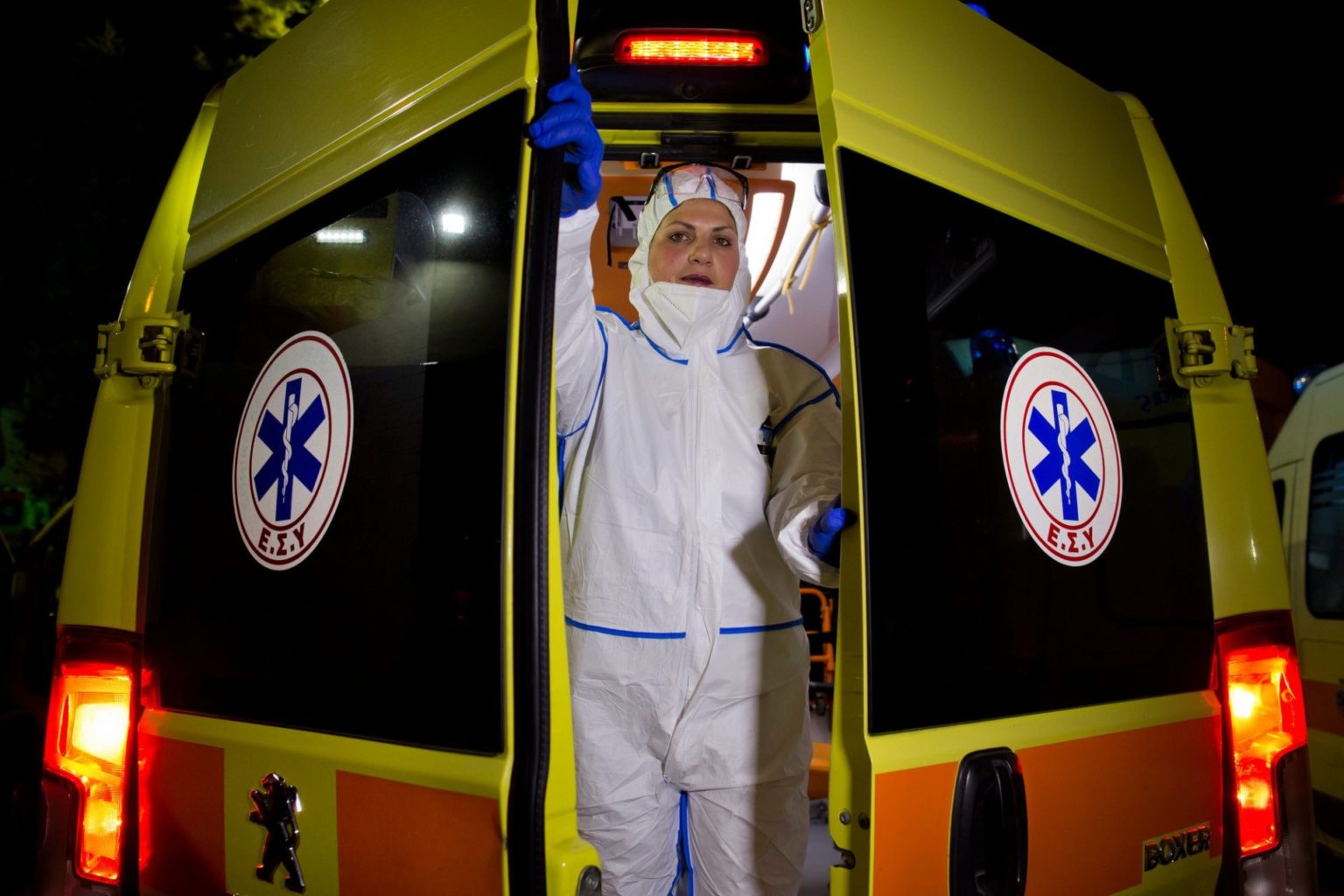
“My friends say I’m a hero, but I don’t feel like a hero; I’m just doing my job and what I really love”
National Emergency Aid Centre (EKAB) Rescuer, Konstantina Papachristodoulou (L), 39 y.o., poses in an ambulance at the operation centre of EKAB, 11 April 2020. Katerina Papachristodoulou is married to a National Emergency Aid Centre (EKAB) rescuer and has one child.
